#it's more than a little terrifying that i have a deeper understanding of those terms than most of my medical support team
Text
So this is going to be a bit rambly, but, well, what is tumblr for if not a good ramble to the void? TW: medical information in the next two paragraphs. TW: drugs/painkiller use vaguely referenced in the rest.
I had my seventh knee surgery on July 15. It’s my second this year. The first was in April to harvest a bit of my own cartilage, clean up the joint, and to remove a *surprise* plica that my body decided to grow in the worst possible place to try and stabilize my knee joint, forgetting (of course) that we forgot to digest the first one when I was a fetus, leading to all sorts of fuckery when I was a pubescent teen and resulting in the first of my seven knee surgeries at the age of 14. Ah, band camp. . .
But they took that little sample and sent it off to some lab in Massachusetts (yes, my friend and my brother in Boston both joked about visiting it) to grow a big ol’ chunk of new cartilage to patch into my knee. (”Like filling in a pothole” - my eloquent surgeon.) And in July they went in and flipped my kneecap entirely over and indeed patched the 3.9 CENTIMETER pothole/defect/affected area in my patella. Do you know how big a kneecap is? Google claims that the mean patella width is 3.79 cm. So I imagine I now have approximately 95% new cartilage on my knee, grafted in with some porcine membrane, and a nice long incision above my old, scarred over incision from my third knee surgery. . .
Anyways, I took two full weeks off from the surgery and this week I have been working remotely. Except my boss left on vacation and didn’t tell me what my focus should be. And my focus is absolutely shot after a year of escalating burnout and deepening apathy and also the responsible use of percocet to assist in my recovery. And I started physical therapy this week which has been a whole thing but ultimately leaves me feeling like a hollowed-out shadow camped out on a glacier after just 40 minutes of “can you squeeze this muscle?”.
The upside is that I have gotten more rest in the last 2.5 weeks than I have in a long time and my brain is slowly starting to spin into creative mode even if it’s not yet ready for work-creative. So maybe I will finish writing a novel sometime before the next century.
And because I use tumblr as a journaling exercise, be prepared for my blog to just sort of kick into a high gear of my rambles. I’m going to attempt to sort out by topic (yes, you’ll be getting a Sarah J. Maas thought stream) but I also can’t really make too many promises.
#personal#about me#surgery recovery#medical discussion#for those who are super curious#i had the MACI procedure#also known as the matrix-induced autologous chondrocyte implantation procedure#it's more than a little terrifying that i have a deeper understanding of those terms than most of my medical support team#i am an environmental biologist#granted i have now had seven knee surgeries#but still#the surprise and bafflement on the PT team's faces and the hospital nurses has been far from encouraging#anyways#i am on to write about sarah j. maas
3 notes
·
View notes
Text
So I've been working on a Feyd-Rautha/Reader fanfic, and am working out various headcanons I have for him in terms of his sexual preferences and past, as well as what I've written but might be a little too silly to include in future chapters and kind of want to get it out there to get an opinion on things.
Link here: And I Don't Want Your Heart - Chapter 1 - ooihcnoiwlerh - Dune (2021) [Archive of Our Own]
Some of my NSFW headcanons down below
-Okay, so it's firmly established that he's a sadomasochist. It's also mentioned in the books that he'd been abused by his uncle when he was younger. I don't think the two necessarily have to correlate but I think on some level he finds physical pain cathartic, and the moments in which he's masochistic to him feel like he's reclaiming something for himself. He chooses the pain rather than having it inflicted on him.
-I get the impression that he's generally more dominant but in the right headspace with the right person can enjoy being more submissive. It has to be explicitly on his terms, though. Like with pain, he has to make it clear that this is something he's giving of his own free will and that is not to be taken lightly.
-I don't think he would or could ever tolerate being subjected to humiliation, degradation, or feeling emasculated. Subjecting a partner to that, sure, but I feel like that would actually be a severe trigger for him so someone calling him pathetic or questioning his manhood in the bedroom may very well get killed on the spot for it. He's buried a lot of his trauma from his uncle's abuse but those things awaken it.
-I don't think there's a specific kink community with a vocabulary or guidelines on Geidi Prime. I don't think he knows what a trigger or a safeword is. As established already in my fic, he doesn't fully understand the concept of aftercare and is pretty bad at providing it (so far.)
-Being an arena fighter on Geidi Prime basically makes him a rock star, and as such he does get his equivalent of groupies. He's never been in an actual romantic relationship, but people fascinated with his brutality in the arena have gotten curious about what he's like in the bedroom and while it doesn't happen all the time, he has sufficiently satisfied their curiosity.
-I'm not sure if this will end up making it into the fic, but I picture him as being predominantly but not exclusively attracted to women, and as someone who's had a couple of consensual encounters with men as an adult, partly out of genuine curiosity/interest and partly to reclaim some level of power.
-Spoilers for future chapters--I'm writing it that he doesn't have sex with his Darlings. They're a little too animalistic even for him. He doesn't mind if people assume he does, though, because of the danger and fear associated with it.
-He enjoys period sex. Nothing deeper about it, the man just likes blood. Will also enthusiastically go down on his partner during the heaviest days.
-So...here's where I'm worried it's going to get a little goofy. While he has a lot of kinks that would be considered adjacent to BDSM, as I said I don't picture there being a specific community. I wrote a scene that hasn't been posted yet of Feyd-Rautha using a flogger on the Reader character and her initially being terrified thinking it's a cat-of-nine-tails and calming down somewhat when she realizes it's not that severe. I'm worried it will seem ridiculous, but I could also picture him having something certain tools custom-made for him. It was one of the first scenes I wrote for this fic but am worried it will come across as tacky/not fitting for the environment. Granted, I'm not writing a particularly substantial fanfic. It's completely removed from the main plot and is mostly a combination of character study and smut so I think anyone who's enjoying it probably knows that it's not that deep. *
*Although to be clear, I'd love to hear from people on that they think.
41 notes
·
View notes
Text

Masterpost
@wolfstarmicrofic
Prompt: afraid
Fear is a relative term. Some people are scared of the dark. Others find it in insects or heights or tight spaces. More still are terrified of death and what comes after, what that will mean for them and their souls, if they believe in those sorts of things, but Sirius has never worried much with any of these. What Sirius fears is far worse to him. Sirius is afraid of losing.
Loss is something Sirius is well-versed in. He's lost a lot in his life so far, but he feels as though he's gained much more, a better family along the way, that love he'd always been missing as a child. His friends have given him everything, and without it, Sirius knows he'd be nothing, not even worth a second glance from anyone. He'd thought, for a long time, that the Potters slipping away from him would be the worst thing possible, the most he'd ever stand to lose, but now he's looking at the new life somehow forming around him through all this mess, and Sirius is realizing he stands to lose so much more than he'd ever imagined.
The next week passes in a half-blur of anger, anguish, and that startling relief that Remus seems to provide him at nearly every turn, always managing to pull Sirius from his darkest moments when he thinks no one else could. He's soft and kind under most circumstances, but firm and unwavering when Sirius needs it most, like Remus can tell and knows just when to use which tactic to gain the best results. Sirius isn't sure how he does it, watching the other man constantly, trying to sort it out in his head, make sense of the things that aren't lining up properly yet.
He still studies Remus when he sleeps, thinking that will give him some clues, that ability to simply stare unhindered, but it doesn't. Sirius finds things he's never noticed before, like a fine scar just over one side of his upper lip, one eyelash that's slightly longer than all the rest, grazing the man's cheek with a delicacy even silk can't rival. He maps the slant of his nose, observing the random cluster of freckles near the tip, and once, for a second, Sirius almost leans in to touch them before he stops himself.
Teddy comes to stay with them again, and Sirius basks in his jovial presence, but he only stays for a day before Remus falls ill and aching. Dora comes back to pick him up, doting on Remus while she's there, checking him over, pushing him to rest. Sirius is grateful for it, but he also feels a surge of jealousy rise in him that he can't understand.
When they're gone, Sirius keeps a close eye on Remus, remaining near to his side. The other man doesn't complain about his presence, but he tells Sirius not to worry, that it happens often, a shadow falling over his eyes that only concerns Sirius further instead of abating it. And then, the next night, without an explanation, Remus disappears, leaving Sirius alone until he returns in the morning, shuffling through the door on barely moving feet, looking pale and drawn, haggard in a way Sirius hasn't seen him before. He meets Sirius' eyes as he pushes the door closed behind him, leaning on the handle heavily, his mouth opening to speak, and then he collapses, and the terror spikes in Sirius deeper.
Remus rouses hours later, Sirius having managed to get him in the bed. He's stripped down to his pants beneath the warmth of the layers of blankets Sirius had piled over him. Remus stirs a bit but stills when he sees Sirius seated beside him, hovering a little, watching his face as he wakes and returns to consciousness. Sirius doesn't speak as Remus glances down at himself, taking in his bare chest and arms, the scars there standing out in the afternoon light of the sun, gleaming faintly like rivulets of streaming water. Remus' eyes lift to meet Sirius', mostly blank, but Sirius can see the shields flying up, guarding against the panic steadily rising.
"What did you – ?" starts Remus, but something in Sirius' gaze seems to stop him.
"I patched up what I could with flannels and bandages," explains Sirius. "You weren't too bad off, but I don't have a wand and couldn't manage to use yours, though I'm guessing trying to heal the wounds likely wouldn't have been very successful." Remus stares at him, his mouth twisting into a terrible line that Sirius hates on sight. "You're a werewolf. That's why you knew about the moons, why you didn't go to Hogwarts or any school. Right?"
And there it is, that fear flooding through Remus as he physically tries to retreat into the bed, looking caged and trapped. "Sirius – " he rasps out nearly pleadingly, but Sirius only shakes his head, silencing him as he reaches to the side table and grabs up the glass of water he'd left there.
"Drink," he instructs, hand slotting behind Remus' head, lifting it enough to press the cup to the other man's lips. Remus' wide brown eyes remain fixed on him with a slow-building terror as he does as he's told, downing half the glass before he pushes it away, glancing at it briefly as though he thinks it might be poisoned. Sirius never looks away from him as he settles the water back in place and says, "I don't care, Remus."
Remus' mouth drops open, his jaw falling slack. "You don't – " he tries to repeat, but he stops, snapping his teeth together quickly. "You don't understand, Sirius."
"I understand. You're a werewolf, and that's not your fault. As far as I can tell you're not hurting anyone. You have people that love you unconditionally, a family that you love in return," says Sirius factually. "And you've been helping an irritating stranger for a month now when you could have just as easily ignored me."
Remus shakes his head, brown eyes still impossibly wide. Sirius thinks he might want to drown in them. "You're not a stranger," he whispers.
"No, I'm not," says Sirius just as quietly, and then he's leaning down without another second of thought and kissing him.
#these days of dying#wolfstar#sirius black#remus lupin#sirius x remus#sirius/remus#wolfstarmicrofic#my writing#my microfics#holli writes
47 notes
·
View notes
Text
I keep seeing posts about a "love triangle" between Geralt, Jaskier and Yennefer; sort of wondering who would be "in the middle" ...
... and here I am, picturing them in a full polyromantic and polyamorous relationship together, having each developed their shared as well as unique connections with each other, raising and protecting Ciri together, each bringing in their own unique set of skills to share with the girl.
That's not to say that the polyromantic/polyamorous relationships where there's a "middle", and two of the three partners aren't really into each other romantically and/or sexually, are wrong or not valid.
On the contrary.
But after what I've seen in Season 2, I can fully imagine Jaskier and Yennefer being involved together directly, without needing Geralt to maintain the interest and connection in their relationship alive.
After all, it's been rather well established that this version of Jaskier is drawn to strong and autonomous people in general, and that he genuinely falls in love with virtually everyone he meets, rather than seek to "trick them" into having sex with him under potentially false pretenses.
His antagonism towards Yennefer came largely, in my personal belief, from his very first significant memory of her.
Waking up to find Yennefer half naked by the foot of his bed - threatening him to get what she wants through sheer power and superior strength - literally assaulting him by grabbing him by the balls - after ordering him to "do some scales for her" to test his voice, is bound to start any potential relationship on the wrong foot.
Not to mention that singing is intimately tied to Jaskier's identity and self-esteem. So, making him sing under duress (rather than because he wishes to express himself, and willingly share that part of himself with others) and grabbing his genitals like that, made him perceive her as a threatening predator / monster.
Hostility comes generally from fear.
And he doesn't even try to hide that he doesn't trust her, and wishes Geralt would keep his distances from her because she is a terrifying witch.
He even watched her openly manipulate that knight for her own gain on the dragon hunt - her interest in him entirely devoid of any sincerity or emotional connection.
"Sometimes, the best thing a flower can do for us is die", she was taught.
Then suddenly, she comes to him humbled, without magic, on the run, among those persecuted for having eleven blood, and - though still very capable and potentially scary in her own way - no longer acting predatory towards him.
They are HUGGING!!!
She is now a prey needing his help and protection; and asking him for it, rather than trying to take it by force from him.
It does not make their prior encounter okay per say... But like Batey said, Jaskier is both an absolute genius and a total idiot.
I think he did get a sense that, when they first met, she was hungry and desperate to fill a certain void within herself; and that there was a more complex, deeper story beneath her behavior and who she was that he knew very little about.
Jaskier can now afford to look at her and truly listen without fear, as she shows vulnerability and respect for who he is and what matters to him as well.
She's even the one implying that there's more to him than "being a bard", and that he'd find a new purpose if he could no longer sing or write songs.
She's grown, he's grown, they have a deep mutual understanding of loss, and feeling unwanted...
They do not need Geralt in the middle to relate to each other, care about each other, and even grow to love each other.
And yeah, I think that Jaskier's teasing is also a way for him to move past the primal fear she once inspired him, come to term with those feelings, and move past them.
He seems to be a big believer in second (third, fourth...) chances, and leaving room for people to learn from past mistakes and misbehaviors, and grow.
So yes, she did overstep important boundaries and terrified him at first... But now he's learned that she's also able of risking her own life for those she cares about, and she came back to save him despite no longer having her magic, thus putting herself in significant danger.
If that had been the version of Yennefer he'd first encountered, Jaskier would likely have tried saving her from the djinn himself.
Geralt saw the cracks through her façade because she never was a predator to him.
The hunger she felt and void she was trying to fill? He understood where it came from, and saw a kindred spirit in her.
The initial connections may have been Geralt <--> Jaskier, and Geralt <--> Yennefer...
But Season 2 evened the power dynamic between them to offer us Yennefer <--> Jaskier; and it was beautiful, and phenomenal, and felt very genuine and organic...
And I just want them to be happy all three together now, for some reason...
#The Witcher#Yennefer#Jaskier#Geralt of Rivia#Yennaskier#Geraskier#Yennefer X Geralt#Yenalt#Yenralt#?#What's the name of that ship?#Yengeraskier#Another#OT3#Season 2 spoilers#My thoughts#My posts#Yennskier#is apparently the name of the ship...#and#Geraskefer#Good to know!
258 notes
·
View notes
Text
The Subtle Horror of Evangelion
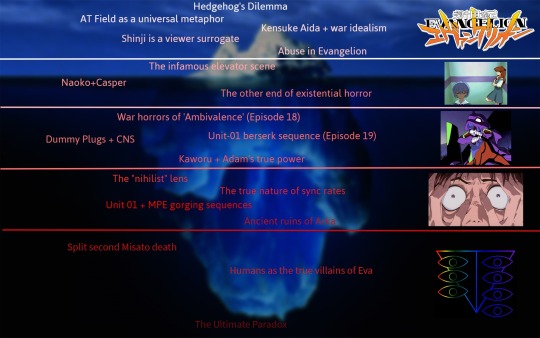
What keeps us all hooked to Eva time and time again? You get through your initial, confused watch of either Evangelion endgame, probably sometime in your adolescence wondering what the hell it is you just watched. The original source material is suffused with unsettling imagery, and sometimes too-close-for-comfort shorts. It’s so much to process that one watch is never enough. The imagery isn’t enough, however, because the mid-to-late-90s series comes with things you’ll pick up the more you focus on certain characters’ struggles or the interesting world-building. They arise little by little with every re-watch, adding onto what interested you in Eva to begin with.
There’s always that little voice asking you “What it is that really draws me here?”
Oh. The horrors.
The tragedy of it all.
These things never leave you the second you bear witness to them, whether you become aware of them or not. You’re disturbed over it, a tad worried, no doubt, but you’re strangely hooked.
Horror works better on limitation, it’s why found footage capturing pale, ghastly, monstrosities of the deep wood will always stand as exponentially terrifying. While most all of us have taken cracks at Eva’s budget at some point, that’s what really drives these terrors home. Its low budget nature made it work.
Evangelion has commentary which forces a viewer to reflect. Most no one enjoys that. It’s the fear, however, that has its audience come back. Evangelion’s reflection alone isn’t what gives Eva it’s charm decades after its run. It’s the little things, most everyone misses, the anxieties, the terrors, all of it. Most of those things, fly over a lot of fans’ heads.
Buckle up, there’s a lot to go through…. (warning for mentions of abuse, body horror, means of suicide, nudity, blood, and gore)
Table of Contents
I. Icebergs for Dummies
Tier 1: The Tip of the Iceberg
II. The Hedgehog’s Dilemma
III. The AT-Field as a Universal Metaphor
IV. Kensuke Aida + War Idealism
V. Shinji is the Audience Surrogate
VI. Abuse in Evangelion
Tier 2: Just Below the Tip
VII. The Infamous Elevator Scene
VIII. Naoko + Casper
IX. The Other End of Existential Horror
Tier 3: The Body of The Iceberg
X. War Horrors of ‘Ambivalence’
XI. Unit-01 Berserk Scene
XII. Dummy Plugs + CNS
XIII. Kaworu + Adam’s True Power
Tier 4: Pre-Abyss
XIV. The “Nihilist” Lens
XV. The True Nature of Sync Rates
XVI. Unit 01+ MPE Gorging Scenes
XVII. Ancient Ruins of Arka
Tier 5: The Abyss
XVIII. Split Second Misato Death
XIX. Humans Are The Villains in Eva
XX. The Ultimate Paradox
XXI. Conclusion
I. Icebergs for Dummies
For those unaware, the iceberg image illustrates that things are much deeper than they appear, just like an actual iceberg. You’ve probably seen this selfsame iceberg--- separated by tiers--- a few times looking through late night internet rabbit holes (Putting it out in the open: I’m personally guilty of this!), fictional or non. It helps you understand why you’re so enticed to certain material, that you’d revisit them. The highest parts of the iceberg are the things in the material most everyone knows, the surface level stuff. The lower you go, however, the lesser known the parts of the material are. These are the things the person are aware of.
Eva has some iceberg illustrations if you look around, albeit they don’t go through the more saddening, sometimes graphic factors of Eva, only theories navigating through Eva’s universe. Evangelion is so deceptively packed with blink-and-you’ll-miss-it subtleties that if an iceberg were centered on that, the diagram would be packed. And I’m being generous as I write this.
A few ground rules, before we begin: The iceberg will deal with the more obscure and dark material as the tiers get higher rather than it only being relegated to obscure bits. The lower the tier, the higher the iceberg and the more subtler the anxieties which graduate into horrors the deeper you go.
Yes, Evangelion is occasionally horrifying. No, Evangelion is not lovecraftian. I think people use the term lovecraftian way too freely. It’s not enough to see something with (sometimes too many) limbs twisted in ungodly angles. Or legs where legs shouldn’t be. The same applies for creatures assuming forms we don’t entirely comprehend. Eva has never delved into the angels being incomprehensibly terrifying specifically because they come from a cosmic expanse.
Some of these actual horrors, big and small, hit you after adolescence, something that makes you feel deeply for the characters’ dilemmas. It’s a feeling that grows and sometimes aches, rather than fades over time for many of us.
Tier 1: The Tip of the Iceberg

II. Hedgehog’s Dilemma
III. The AT Field as a Universal Metaphor
IV. Kensuke Aida + War Idealism
V. Shinji As the Audience Surrogate
VI. Abuse in Evangelion
II. Hedgehog’s Dilemma
Evangelion has its hand in so many psychological and philosophical cookie jars, from Freud, to Maslow, Johari, as well as Dostoevsky. The very tip of the Subtle Horrors of Evangelion Iceberg is something viewers are introduced to in the fourth episode of the series. It is one of the many psychological concepts dotted throughout the original show. Out of all those psychological concepts, this is the most explicit and most recurring.
The Hedgehog’s Dilemma describes the conundrum of two hedgehogs. The closer two hedgehogs become to one another, the more they harm each other with their spines. If you want to properly live, you need the closeness and intimacy of others. By allowing yourself to be close, however, you end up at great risk of being hurt. It’s the very reason what drives those who live to become guarded. Being perpetually apprehensive or building up walls isn’t a remedy for pains, however. The Hedgehog’s Dilemma isn’t just about why people become guarded after relationships ended on bad notes. It’s about the overall inevitability of pain.
Life is a continual push-pull of relationships, because we’re all creatures of comfort. We guard ourselves to varying degrees and sometimes even tell ourselves we won’t get close again, but personal comfort is one of our most ultimate drives.
The Hedgehog’s Dilemma not only describes that harm happens to us anyway, but illustrates that because comfort is universal we seek companionship regardless.
III. The AT-Field as a Universal Metaphor

The AT-Field is the most crucial rabbit hole in understanding the largest meta-narrative of Evangelion.
If Hedgehog’s Dilemma explains the what and the why people become more or less guarded, then AT-Fields explain the how. People build up walls around themselves all the time. You walk away from someone because they crack a smile at you... and it seems off.
Because you feel an anxious pang.
That’s an AT Field.
AT-Fields, or Absolute Terror Fields bear a few metaphors, one of which being boundaries. You see it as Shinji’s fear of becoming intimate, knowing the future implications or Asuka’s masculine protest (putting up a front). We can see an excellent example of the AT Field used by Asuka, her “Wall of Jericho” in episode 9.
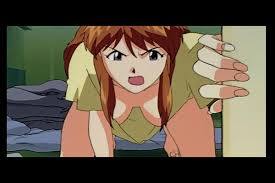
You also see it manifested through the angels, the strange creatures in Eva who supposedly desire to merge with Adam, their mother. Seeing this in the angels makes you realize that the AT Field is actually a metaphor for boundaries which implicates us all. In episode 22, Arael, 15th angel, seeks to understand Asuka. The angel uses its AT-Field (a beam of light) no, its boundary, to breach Asuka’s boundaries.


AT-Fields can be used to not only build up personal walls but to breach them as well. The irony of Arael’s action is that Arael’s AT-Field being erected while it floats just over Earth’s gravitational field makes it immensely similar to the Second Child; they’re both guarded.
The AT-Field is a funny sort of thing because it also sometimes explains how two people who are so alike can be guarded from one another. Sometimes you gain contempt for someone because they’re too much like your least favorable traits. You see this with Shinji and Asuka, both children without their mother desiring validation. Shinji calls Asuka a child midway into episode 9 and Asuka isn’t shy on voicing ideas of Shinji as dense or immature. They’re throwing stones in glass houses.
AT Fields are used to get the user out of dangers both physical and perceived. Sachiel, 3rd angel in the original series’ pilot episode, uses its AT-Field, in the form of flotation, to get itself from enemy fire. It never shows this until it is attacked first.
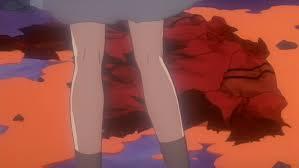
AT Fields are also responsible for one’s identity and physicality in Eva. Without the AT Field you don’t really exist. When Rei assumes the form of the person the character being cast into Instrumentality loved most in End of Evangelion, she’s causing the character to give up their AT Field. With that gone, they lose their physicality, turning into LCL (given the lovely term ‘tanged’ by fans). The ‘tanged’ individual suffers metaphorical death. Evangelion argues that in order for one to exist, others must perceive you and you must perceive you, a point best illustrated in episode 16. Since everyone is converted to LCL, no one really ‘exists.’ Rei describes this unnerving state as the inability of differentiating who you are and others, since everyone lacks a physical state without AT-Fields. Metaphorical death can be argued as worse than physical, since we all exist to make an impression of some sort. It’s what ties all the Eva cast together and the cause of their dilemmas. Validation. You can be living, yet very much forgotten or simply unknown.
There is living and there is “living.”
You can’t “die” unless someone knows you. You were never there.
AT Fields are the thing that make us live, but as a drawback, prevents us from understanding each other fully. Kaworu states in episode 24 that AT Fields are the wall of the mind and the heart of the soul, an unapproachable piece of sanctuary. When all else is taken from us, all we have left is our place of respite.
I’d also like to pitch the saddening reality that the AT-Fields are what prevent us from understanding angels as a whole, our genetic siblings as scared of this world as we are. The psychological angels want to understand us, that much is true. The angels, however, use forms of communication at the expense of our boundaries. Because people greatly value boundaries it makes it hard for us to comprehend angels. The creatures are hardly malicious when you realize they wonder why we all do things that actually hurt us, as well as the fact that they do understand our minds. But, because they breach our boundaries, we become even more wary of the (mostly) unknown. Angels may be us, but the strange forms they take are something we aren’t familiar with. The feeling is mutual with angels, wondering why there are many of us, our forms and outward appearances so identical. It’s a truth as old as time that we all fear the unknown.
The anxiety of an AT Field means comprehending that there’s very little chance to 100% get others. Because we’re all wary in some degree, because we’re set in an idea or perception of someone, even if the someone in the past no longer applies. It’s not healthy for you to continue dwelling on relationships not meant to be, keeping yourself up at night asking why, because both of you have closed off each other for good. There’s always that chance the other can come back and if they do seek to understand despite past hardships, that’s good. If they don’t, all you can do is move on and accept it.
IV. Kensuke Aida + War Idealism
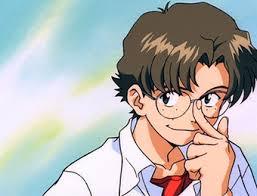
Kensuke is one of Shinji’s classmates, a supporting player in the series. He’s close with Toji Suzuhara, a boy who takes his anger on Shinji, after finding out that his sister has been injured during Shinji’s fight with 3rd angel Sachiel. As Suzuhara beats him down, Kensuke downplays the incident. Kensuke’s and Toji’s relationship is particularly interesting because the latter is affected to some degree by war (the war by humanity to prevent our destruction by angels). Kensuke glorifies the sentient, implicitly eldritch, multi-armored war-machines.
Kensuke can be best described as the ‘wow, cool robots’ drawing you’ve probably seen floating around. This is in relation to Gundam’s war commentary, but replace Gundam with Eva. Kensuke is enamored with the Evangelions and totally, willfully ignorant to the war horrors. Adolescents are forced to be the salvation of humanity, feeling every bit of damage to their own bodies whenever the Evangelion takes any hurt. Even after the war for humanity is long over, the pilots will be afflicted with traumas that will always hang over them.
Kensuke’s glorification is also what draws him to be Shinji’s friend. He uses Shinji’s status as a way of becoming a pilot himself by meeting up with Misato, putting himself at the cockpit of a strange creature magnificent machine.
When Toji becomes hospitalized after his battle in a hijacked Unit-03 vs. A Dummy System-controlled Unit-01, Kensuke expresses discontent at not being a pilot. He’s annoyed because “everyone” but him is a pilot.
Thing is, Kensuke isn’t heartless, just ignorant. Idealism is one of the uglier things that runs thick in the heart of Evangelion. His is one of many cases of unhealthy idealism in Eva, another example of making it difficult for those living to understand one another.
V. Shinji as the Audience Surrogate
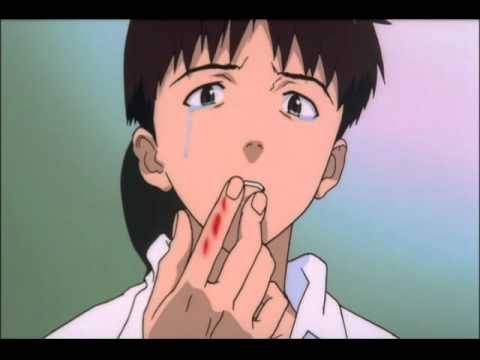
Shinji as the audience surrogate isn’t always touched up on, but is sort of understood subconsciously by a lot of the viewers. Shinji’s character is specific, yet so generalized that him being a surrogate for the audience just… works. Don’t believe me? Shinji gets two psychological exploration-based episodes whereas Asuka and Rei each have one. Episodes 16 and 24 are both psychological angel episodes, albeit the latter is more in-series subversive. The 24th episode doesn’t involve a breach of subconscious boundary, but the pilot (Shinji) is in the hot-seat, being made aware of their issues. Leliel, 12th angel, contacts Shinji in the former of these. Both characters talk to one another, shown as a series of horizontal lines and vertical lines, sometimes intersecting. These lines are a strong reference to the Johari Window, a tool in psychology which helps someone become more aware of themselves. The Window’s quadrants are as follows
1. the part known to the self
2. the part known to others
3. the part known to the self and others
4. the part known to no one
Leliel also states that the self only exists of one perceives themselves as well as others. The angel also states that Shinji could better his reality, to which Shinji absolves himself of responsibility by arguing the horrible state of his reality. It’s a subtle pushing to Shinji and by extension the viewer into free will. Kaworu builds up on these concepts with Eva’s in-universe concept for boundaries. Free Will versus Determinism is brought up here, with the idea that AT-Fields are brought up because the living (again, not people – emotional complexities aren’t only human) will them into existence. By exercising free will, it means enduring pain, one of Shinji’s, and again the audience’s greatest fears. Any relationship has pains and conflicts. This is all a buildup of free will, determinism, self-awareness, and the Hedgehog’s Dilemma. Understanding all of these means swallowing the “pain is inevitable” pill. The problem with much of us is that we like the idea of relationships rather than being in one. We want to feel validated but without the conflict, even if the conflict can be solved. We’re all Shinji because we’re all aware to life’s hellish catch-22s, so we run. There’s times in our lives where we run as far as possible from these woes, these truths, but there’s pain in running too. It’s why escapism seems like such a viable action for some of us.
Pain is inevitable, but pain can be mitigated.
More damning evidence to Shinji being a viewer stand-in lies in either endgame of Evangelion (pun intended). In EoE, after the Komm Susser Tod sequence of everyone on Earth being tanged, we’re treated to a shot of EoE’s live audience.
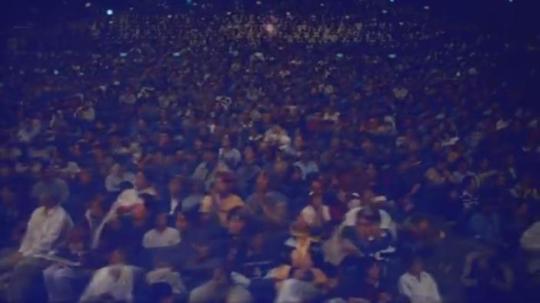
We hear Shinji’s voice about his reality while he talks to Rei toward EoE’s end. There are shots of the city, of people going about their daily lives cementing that this is about us. End of Evangelion shows us a less favorable side of Shinji, a departure from the lauded end series “Congratulations” scene, in which he does understand free will rather than perpetually dwell on negatives. Shinji reacts unfavorably toward Asuka in EoE after his mother’s speech to the audience that ‘anywhere can be paradise’ and Shinji stating he doesn’t know where his happiness resides. Shinji (We) still has a ways to go if he wants to be a better person.
It’s probably why many of us are either inclined to champion Shinji or harangue him, and either reaction is fair. Many of us are aware of audience surrogates, but never to this extent. Shinji isn’t his best person, but he can be. Being his best means self-reflection. Droves of people who first were exposed to Evangelion were teens, and again many of Shinji’s woes are specific yet so generalized, hence our feelings of defense and possibly disgust.
No one likes scathing, yet accurate call-outs on their person, but they’re paramount for us to understand ourselves and others.
VI. Abuse in Evangelion
One of the worst things recurring in all of original Evangelion is a bevvy of abuses.
Abuse comes in many shapes and forms and it’s many characters’ realities. Abuse happens not because the universe ‘wills it’ (determinism aka, ‘that’s just how people are’). Abuse, be it conscious emotional absence, actual neglect, among other ungodly acts fly though the cast.
Abuse is cyclical and a lot of those doing it often get away with murder because they have power.
Much of Eva is comprised of children being forced to sort through adults’ emotional baggage. Those children become adults and the cycle continues.
We all know a Gendo. Or even perhaps a Misato. Hell, even a Ritsuko.
Anno states that Gendo’s character is of a societal meta-text, which explains many viewers’ ire in relation to the character. He’s responsible for many of the seedy goings-on in Evangelion be it the financial (see: Jet Alone’s orchestrated out-of-control nature to give NERV more funding) or abuses (see: Rei, Shinji, Ritsuko, and, Naoko). It’s for this reason why Gendo’s actions are a sore spot for a lot of fans.
Anno: I’m not sure that it’s a real father [that Gendo represents]. Well, not a father in the sense of a parent with a blood relation to his child, but more, I think, [in the sense of being] a representative of society or the system. That’s why he has that expression.
Takekuma: So, he’s kind of amorphous.
Anno: The angels are the same. I made them appear amorphous in that way because, for me, society is unclear, the enemy is unclear.
Takekuma: Gendo is [a representation of] the boundries or the pressure of society itself.
Anno: That might be it. Perhaps Gendo is [a representation of] society itself.
http://wiki.evageeks.org/Statements_by_Evangelion_Staff
After many re-watches of certain Eva episodes, it just hit me, as I’m writing this why I’m sometimes apprehensive on an adult-exclusive lens of the show. This happens a lot in adolescence and our struggles are made trivial because of the mishandled baggage. As children, you’re meant to be subservient to parental whims. You have this sort of obligation to solve their problems. Give them closure. It doesn’t even need to be parental baggage, but just from adults in general. You see the way the adults act not just with the children but with each other. You see the way Gendo justifies neglecting Shinji, objectifying Naoko and Ritsuko or Naoko’s emotional absences as a mother to her daughter (also manifested through the MAGI). It’s these immature excuses as to why they can’t extend empathy to those around them.
It’s always excuses.
Eva’s original series has always been a show about children.
Tier 2: Just Below the Tip

VII. The Infamous Elevator Scene
VIII. Naoko + Casper
IX. The Other End of Existential Horror
VII. The Infamous Elevator Scene
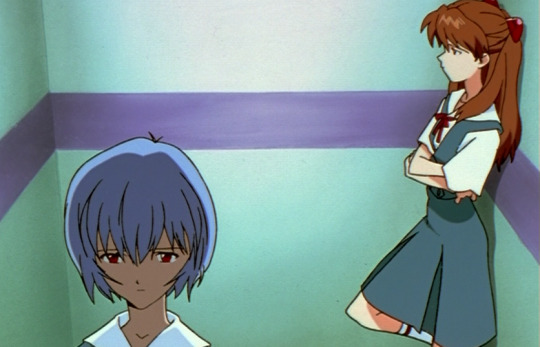
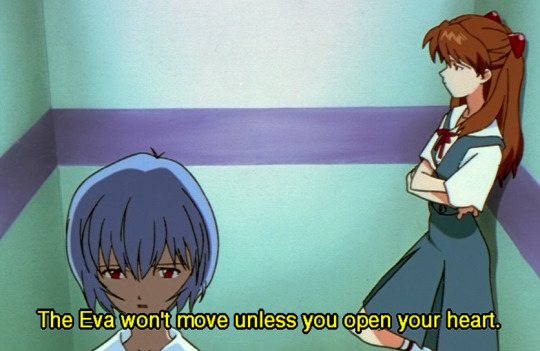
The Elevator Scene is a sequence that sometimes gets glossed over due to Evangelion’s fleeting budget. It took me years to realize the true gravity of the awkward silence of both the 22nd episode and its Director’s Cut version. The Director’s Cut version has Asuka abruptly jerking in the silence, but that blink-and-you’ll-miss-it moment speaks volumes. Understanding the scene means understanding why Asuka quietly stews in her anger. Understanding why Asuka stews means understanding Asuka from her debut to her emotional breakdown.
Asuka’s appearance in the 8th episode, Asuka Strikes!, is marked by a bold persona that carries on until the end. She isn’t shy on imparting her prowess to Shinji, stating that Units 00 as well as 01 were the prototype and the test type, respectively. Her Evangelion, Unit-02 is the finished product. She even states that she graduated from university. Despite these impressive feats so early in adolescence, the only time in which they’re noted is when Asuka talks of them. Misato takes in both Shinji and Asuka, but only ever “dotes” on Shinji. Gendo pays attention to Shinji because he pilots Unit-01, and 01 contains the soul of his late wife. Rei is the clone of Gendo’s late wife, hence Gendo’s attention and overall creepy, selfish obsession with her. Asuka and Shinji’s relationship, with Misato as their caretaker strongly mimics a Golden Child and the Second Fiddle. The only difference is, Shinji gains more attention due to Gendo’s and Misato’s respective baggage. Again, Eva is a series where children are forced to handle the baggage (with no break in the cycle) and when the child doesn’t have anything the adult particularly can clue in on, they become neglected.
That’s Asuka’s dilemma.
It’s why Asuka forces herself to grow up.
It’s why Asuka is driven to be competitive to Shinji and Rei, later growing contemptible at both.
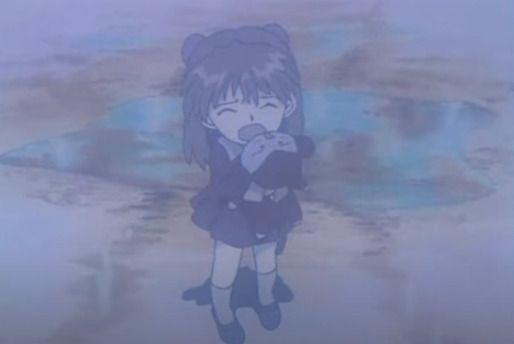

Asuka suffers a few curses, one of which being the youngest, the inevitability of being consciously sidelined dawns on her, leading to her selfsame breakdown toward series’ end. She aligns youth with trivialization, so naturally, she’d front with the opposite. She never gets help in relation to her period. Misato and Ritsuko realize something is up with Asuka but they never really offer her the support.
There’s also the flashback to her trauma in episode 22’s beginning. She’s replaced by her mother post-Contact Experiment (which led to a deterioration of her mental health) via a doll that looks like her, red hair in pigtails. It’s the leading factor to her feigned boldness, her ego. The way in which she is marginalized in the series brings it all back.
Rei breaks the silence with a few words of compassion and all Asuka can do is express disbelief. She mistakes compassion for contempt.
For pity.
The idea that anyone would extend kindness, especially now of all times, is unbelievable.

Asuka also experiences a dilemma here, a dilemma those like her face. She already knows what it means to be vulnerable and deeply hurt, but she needs to make herself vulnerable because now, more than ever, she needs the support. Being vulnerable will cause past traumas to flood back in full force, but by stewing she deprives herself of any support. Rei offers that support, but a few words of support in a wave of trivialization can’t help but feel a bit too strange.
Asuka’s greatest anxiety is realized in the twenty second episode. It’s of being and staying second fiddle, that she’s always been set up to fail. Even 2 episodes after the fact, in which she actually starves herself does she realize once more how she’s permanently ‘below’ others.
Asuka’s curse finds itself in real life, and it’s for that reason why I believe some find themselves resonating with her. Asuka’s gradual descent into bitterness is something I find myself waking up some nights thinking about after 7 years going through Eva; hers is a cautionary tale on being emotionally distant to cries of a damaged youth. Casually imparted knowledge of past achievements, and the competitive attitude mixed with embitterment, some of which from a genuine place but also a product of neglect. We were forced to play second fiddle, we forced ourselves to grow up to feel more legitimate, forced to carry an ire that stews because it seems no one listens.
VIII. Naoko+Casper
The late Naoko Akagi is a woman of multitudes. Those multitudes are compartmentalized into the 3 MAGI. They are Balthasar, Melchior, and Casper.

Casper shows itself to be the most prominent aspect of Naoko’s personality, her as a woman. Ritsuko states that, after the defeat of Iruel, 11th angel, that Casper is the part of her mother which remained that way to the end.
Balthasar and Melchior have been bested, be it by rival MAGI, or Iruel’s assault. This calls back to the fact that Naoko’s other facets aren’t anywhere near as prominent. Naoko has cited her own emotional negligence, of only showing emotions should it ever benefit her.
Casper on 3 occasions fights tooth and nail, Iruel’s assault, an attack by multiple MAGI in End of Evangelion or the defiance of Ritsuko activating the self-destruct sequence. Ritsuko does this to seek vengeance against Gendo for coming to the immense realization that he never genuinely cared for her. Gendo has always used Ritsuko for her body. This would destroy NERV, meaning killing herself and Gendo.
Then you realize why Casper overrides the sequence.
Casper’s stubborn behavior wasn’t actually to defend NERV but to protect Gendo. Casper’s defiance aka Naoko’s emotional absence toward her daughter allowed Gendo to kill a bewildered, rightfully angered Ritsuko.
The saddest part of Casper’s, no, Naoko’s choice is that Naoko got away with murder. Evangelion is a story about children dealing with the selfishness of adults and the adults never receiving justice for their wrongdoings. The relationship between Ritsuko and Naoko is an excellent example that this doesn’t just implicate the young pilots. Ritsuko dies in End of Evangelion with the truth that her mother, as a woman, in the end chose the man who manipulated both of them.
IX. The Other End of Existential Horror
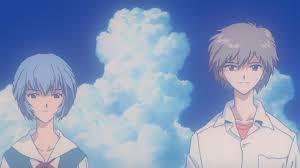
Some spend their whole lives trying to make a mark. Others can’t help but be known.
People get smart sometimes to get themselves out of a current situation. Kaworu and Rei’s existences are such that they’re deadlocked from living. Their existences are the product of an experiment, to be later heavily watched and raised as the Last Messenger. The latter is the result of Gendo’s obsession with his late wife.
Kaworu and Rei’s existential crises are opposite from the rest of the cast; while others do their damndest to become known, they cannot be unknown. Rei’s character centering more around her identity than other characters is also initially and sneakily alluded in the opening.

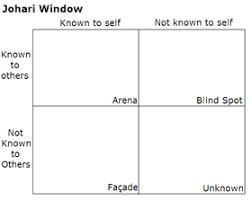
The Johari Window is a tool encouraging self-awareness in the person, alluded to twice in the show, with the second time being in the sixteenth episode. Both usages of that illustration, for Rei, and Shinji drive home crucial aspects of the meta-text.
This would also tie Rei to Shinji in End of Evangelion forcing Shinji to reflect on his own awareness and will. Rei is an astute, young girl whose arc is about her personal relationship with identity, something she is all too familiar with due to her objectified nature. Rei’s arc is even more so entrenched in identity than other characters that she is one of the characters imparting personal and universal realities.
Ayanami Rei’s existence from start to finish is inundated with the issues of others, causing her to internalize being always expendable. In Rei’s Poem in episode 14, it becomes clear that she sees herself based on usage. She likens herself to a field of flowers, which slyly alludes to the Dummy System’s “parts” 9 episodes later, other Reis.

Rei is seen as malleable vessel which houses thoughts rather than her own person and she can’t do anything about it. So she resigns to her reality. Even if she does tell off Gendo in End of Evangelion for his objectifying, she’s not even out of the woods. She never will be.
I used to think Rei’s “slap” to the face to the man with the (most) baggage was empowering. Then I learned about abuse during adolescence, how kids who lack a support system act while away from their abusers. Even saying an emphatic “fuck you” to your abusers isn’t enough to be a happy ending. Rei is a girl who lacks a support system and she suffers from it. Start to finish.
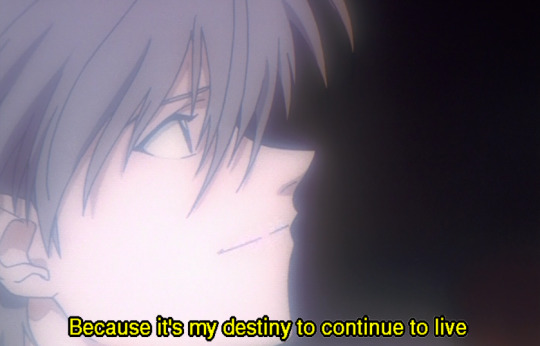
Kaworu’s crises are much trickier to pinpoint because there’s so little to work with. He doesn’t get an episode dealing with personal, subconscious explorations. Getting his character means first getting how Evangelion re-contextualizes what “Ode to Joy” symbolizes. It also means understanding the AT-Field and most people won’t pick that up on an initial foray. Or maybe even a second. Most people don’t pick up that the AT Field implicates anything living and physical or its metaphor for boundaries and identity. There’s the common misconception that Evangelion is a “human” show.
Kaworu marks off his appearance humming “Ode to Joy” while Shinji wonders who to turn to. It’s a song generally known for its jovial nature, but most importantly, Ode to Joy is:
known also as the “Choral” Symphony. Its finale is a musical setting of Friedrich von Schiller ’s “Ode to Joy,” a hymn to the unity and freedom of humanity.
http://www.dictionary.com/browse/ninth-symphony
The Choral Symphony assumes a more horrific context later on. Kaworu is the last messenger and what his action is would lead to the mass annihilation to lilin/human or angels. ‘Unity of man’ is changed in Eva’s context – it marks either unity of man or the death of man. It doesn’t matter who Kaworu allows unity to, because his hands would be stained with death anyway. Then you realize why Kaworu deploys his most powerful AT Field during his descent to Heaven’s Door.
This is his reality.
Kaworu’s status as the Angel of Free Will isn’t about him being the only complex angel, as a lot of people think. It’s about being the sole individual handing that freedom to others.
You realize his terrifying dilemma goes to the tune of being feared for his own existence as an angel (which he notes to Shinji) and not being able to properly live.
Sometimes you ”hurt” people by existing.
Sometimes people hate you for the simple act of existing.
Kaworu’s and Rei’s terror is the other end of existential horror, that you can’t help but forced to be known. Sometimes you have knowledge but aren’t allowed to do much with it.
Tier 3: The Body of The Iceberg

X. War Horrors of ‘Ambivalence’
XI. Unit-01 Berserk Scene
XII. Dummy Plugs + CNS
XIII. Kaworu + Adam’s True Power
X. War Horrors of ‘Ambivalence’
Episode 18 is where anxieties graduate into horrors both implied and visceral. Unease hangs over the episode, with the mystery of Unit-04’s disappearance and tests being done on Unit-03. Misato tells Shinji that because tests would be done, there’d be a pilot there. Misato uneasily withholds this info from Shinji and Kensuke breaks the silence with his recurring desire of being a pilot, still ignorant of the war horrors. There’s a subtlety that Shinji picks up on with Toji but not enough to put two and two together: that the big-eater himself isn’t feeling so hot.
The continual chirp of cicadas and birds nor the peel of the school bell are enough to break the unease of the viewer or of Toji. Toji goes from indirectly being affected by war vs angels to being chosen, drafted even, a child at the first line of defense for the apocalypse. We get a flashback of him beating down Shinji, before it cuts back to present day Toji. He will be in Shinji’s shoes.
Toji balls a fist, a recurring theme in Eva, to the tune of “What is your hand for?” Toji is finally about to take things into his own hands.
Asuka takes a few cracks at Shinji to Hikari that he hasn’t quite gotten the memo, but when Shinji asks her even she’s halted in words.
Then the day comes.
Tests are being done and suddenly Unit-03 goes rogue with Toji in her (note the Evangelions have the souls of the pilots’ mothers, save for Rei). Unit-03’s’s strange behavior is revealed to be the work of the 13th angel, Bardiel. Shinji’s ignorance is made worse by Misato’s absence (with Misato telling Ritsuko she’d tell Shinji the pilot’s info after the tests). Units 00 through 02 are sent out for the new threat and Shinji sees this new threat. Anxiety rises.
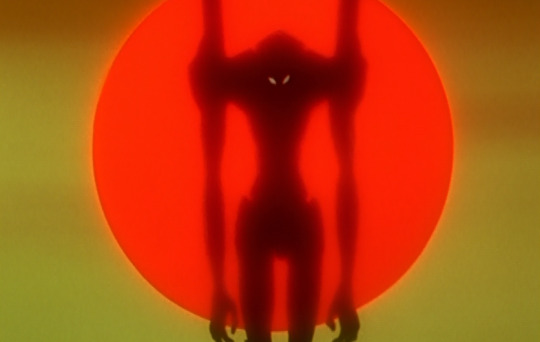
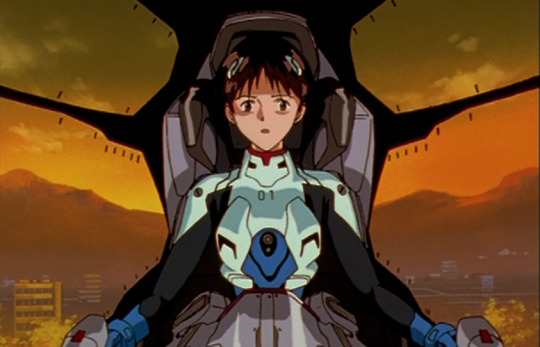
The song “Marking Time Waiting for Death” accentuates the anxiety. Unit-03’s silhouette eerily contrasts with the sun, her body slightly hunched and approaching slowly.
Fear washes over Shinji when he deduces that with an Evangelion inside, there must be a pilot.
Yet he still doesn’t know.
The other pilots are aware, and show reluctance to the revelation. A hijacked Unit-03 sets herself on Asuka, Rei, and even strangling Shinji. Shinji allows the angel-hijacked-being to strangle him, because killing another human being is simply horrific.

Eva has its hand in the war morals cookie jar here because Shinji stands at a conundrum, to other let this creature take his life or to murder flesh and blood. This dilemma goes double-time in war. Gendo asks why Shinji hasn’t dealt with the 13th yet, with a somewhat horrified Shinji pleading about the pilot. Gendo commands for the unfinished Dummy System to override Shinji’s controls and then suddenly...silence….
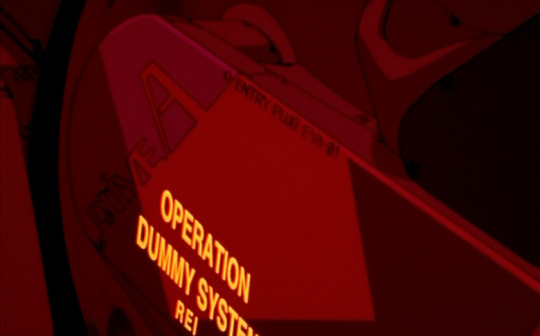
The Dummy Controlled Unit-01 springs back and we’re treated to a close-up of Unit-03/Bardi3l being strangled.


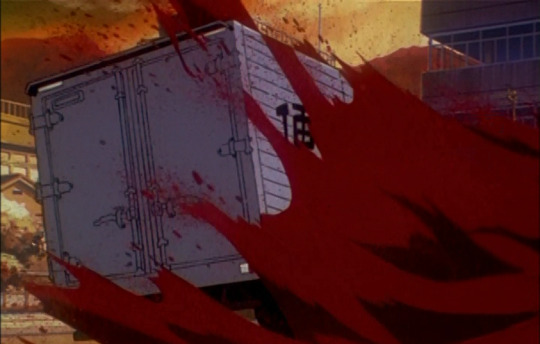
A nauseating crunch sounds and the unit goes limp. A controlled Unit-01 proceeds to raise hell on the incapacitated enemy, resulting in the unit’s blood and guts flowing through the streets. NERV’s personnel can’t do anything save for become fearful at the Dummy System’s capabilities. Terrible, visceral noises sound one by one as blows strike, as the unit’s severed limbs and blood splatters riddle the urban battlefield. Shinji hears every second, every squelch and splat.
Imagine the pain of 03’s pilot.
But the terrors don’t cease here.

01 doesn’t stop at just raising hell on the incapacitated 03, and we’re treated to another close-up shot of 01 tightly holding onto 03’s entry plug, before crushing it.
Somewhere away, Misato receives news that Unit-03 has been dispatched as an angel. Shinji feels the weight of having actually killed someone, before Misato actually breaks the news that the pilot is not only alive but that the greatly injured pilot is his classmate.
It never really hit me until now how this scene holds another horrifying subtlety. Compare this to episode 3, where Toji’s first interaction with Shinji involved him punching him, the very scene playing at this episode’s beginning. The 18th episode ends now with ,Toji and Shinji are both joined in the same camp, of children emotionally and physically marred by war, not able to fully control their situations.
XI. Unit-01 Berserk Sequence
Shinji stands in a situation where he can no longer take the terrors aligned with the Evangelion. He’s gone from sustaining injuries great and small from combat with the eldritch angels, to indirectly harming a friend through it. He resigns from his position as a pilot, understandably running away even with the approach of the 14th angel.
After a talk with Kaji about how he can control his future and he only, Shinji once again puts himself at the forefront of further pains. He must once more thrust himself to the terrors that align with the war-machines whilst struggling with other traumas.
During his fight against Zeruel, his Evangelion dies out and it all floods back to him. Shinji once again finds himself at a position of no power, frantically pressing at his controls to no avail.

He can only hear blow after blow of the 14th’s onslaught. He and Unit-01 are at their most vulnerable.
Until Unit-01 springs back.
W hat follows is the famous Berserk sequence, a scene whose terror can be thanks to Evangelion’s low budget.
We see the Evangelion in all her terror and the sort of off-ness that carries in this scene.

Episode 19 has no problems on treating us to front-row tickets to terror.
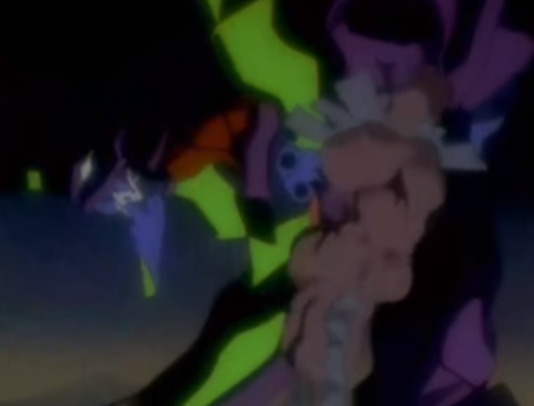
Unit-01 snatches part of Zeruel’s appendage and adds it to her mass. A sickening squelch sounds and her new appendage contorts into place in an instant.
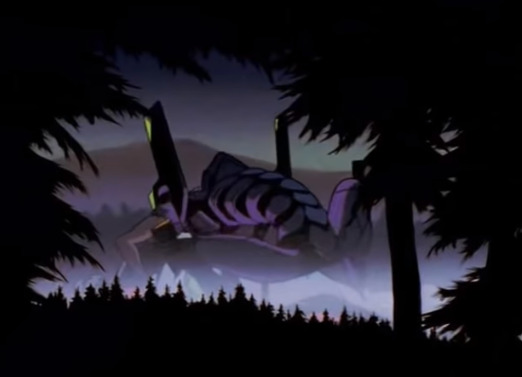

She moves over to her incapacitated, angelic meal and doesn’t hesitate to chow down. The shots feel too personal yet nowhere near in the sense of the show’s meta-textual reflections. It’s almost like stumbling on a cryptid and when she shoots a look at the viewer, it feels as if she’s looking at us, like we’ve interrupted her dinner. Or perhaps she did finish the meal... and she’s in the mood for seconds? Perhaps even thirds?
The bizarre and eldritch nature of the Evangelions goes full force with this imagery. Episodes 2 and 16 laid the foundation of how off the Evangelion Unit-01 was with how she openly mutilates her targets. Or even the unsettling roar of Unit-01 that’s not entirely bestial. The sound is straddles a line between the blood-curdling bestial and the human. But here? Eva Unit-01’s position, from her hunched figure, to her more feral position as she feasts, feels far too organic...and far too human.
The Evas themselves aren’t human, but the souls housed within are. Eva’s souls are souls of the respective pilots’ mothers, an example of the mother and child symbolism omnipresent in Neon Genesis Evangelion.
Shinji’s mother is Yui and as we go through the series, we realize the s2 engine appliance was intentional. An s2 engine offers infinite stores of energy and this is needed for Instrumentality. With the s2 engine within her grasp and the fact that Evas don’t subsist on anything, this would make the consumption of 14th completely recreational.
It’s super tempting to frame this scene as containing some abomination that now stands unchained and indiscriminate in its targets, but it isn’t. It’s sort of understandable because Units 00 and 02 don’t come close to exhibiting this sort of behavior nor were they in this circumstance. Neither Unit-00 nor 02 have any desires in regard to Instrumentality. In the end, we should look to Yui and her own endgame, because Yui’s running the show here.
XII. Dummy Plugs + CNS

Ritsuko states the Dummy Plugs are machines which imitate pilot’s thinking. There’s a bit more than the possibility of this being 100% AI due to the apparatus Rei is in.
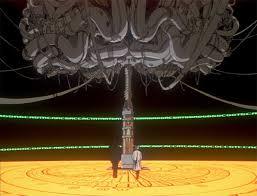
This very likely implies the respective person’s thought processes added with AI programmed in a way which best “describes” the pilot (basically how they are perceived). In episode 17, Rei is situated in this apparatus strongly resembling the central nervous system, the brain and the spinal cord.
{The central nervous system CNS is responsible for integrating sensory information and responding accordingly. It consists of two main components:
1. The spinal cord serves as a conduit for signals between the brain and the rest of the body. It also controls simple musculoskeletal reflexes without input from the brain.
2. The brain is responsible for integrating most sensory information and coordinating body function, both consciously and unconsciously. Complex functions such as thinking and feeling as well as regulation of homeostasis are attributable to different parts of the brain.
https://mcb.berkeley.edu/courses/mcb135e/central.html
Ritsuko imparts the unsettling revelation about Rei and by extension the Dummy Plant itself (after Misato coerced her into learning about Rei). The Reis are the core of the Dummy Plugs (and the System used to brutalize a hijacked Unit-03 and its trapped pilot). This scene adds more to the extent of Rei’s objectification, of her being replaced. It adds on to Rei III’s comment of being ‘the third.’
Rei isn’t savage by any means but the sheer brutality of Dummy System’d Unit-01 5 episodes prior may hint at her straightforward nature.
I’d like to pitch that Ritsuko’s approach to Rei’s Dummy Data was also the product of her subtle animosity toward Rei. When she refers to the Dummy Plug as a machine which mimics human thinking, she’s talking about Rei. She also refers to her similarly in episode 23 by referring to Rei as spare parts, as if Rei herself is some soulless machine whose parts can be switched out if need be. This could also call back to Rei’s poem, in which she calls herself a vessel which holds human thoughts.
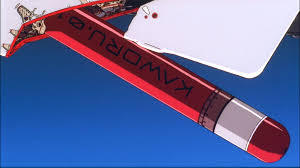
Another question remains: how does Kaworu play into this?
The MPEs (the Mass Production Evangelion series) use Kaworu’s Dummy data, meaning that there are cloned Kaworus stored off somewhere, perhaps floating with soulless smiles the same as Rei has.
Treated as spare parts.
This also implies that Kaworu is more or less reduced to an object.
What’s more disturbing is the nature of the MPEs gratuitous method of ravaging and mutilating Unit-02 and by extension Asuka.
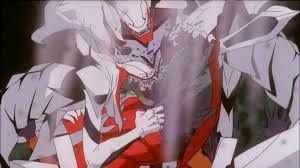
Kaworu hasn’t ever demonstrated any degree of malice, so this can’t really insinuate a ‘Kaworu is secretly evil’ narrative. But this can tie back to a recurring theme of humans fearing and despising angels. It’s because of this that the revelation of our genetically identical nature or the fact that they can comprehend our psychology is framed in-show as kind of shocking. It is because we’re so disturbed at the angels’ existence (or anything else we don’t comprehend) that we view them as inherently savage in nature. Kaworu’s quick-to-perceive personality most likely translated itself along with the AI. This would also rule in the somewhat strategic way in which the MPEs act against Asuka, exploiting her attack patterns through surprise attacks.
Some of Kaworu’s as well as Rei’s Dummy Data are the product of universal (Kaworu) and personal (Rei) contempt by people. Let that sink in.
XIII. Kaworu’s + Adam’s True Power
The bottom of the fridge horror portion of this iceberg is something that has subtly plagued me for years. We’ve only ever caught glimpses of Kaworu’s abilities in his debut episode. I picked up on it little by little with each re-watch of the episode, with every other time his abilities dawning on me. If I wasn’t focusing on how his character fits in the greater framework of Evangelion, I was cluing in on his abilities.

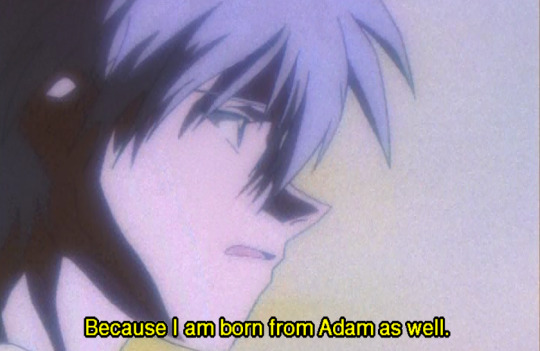
One of his abilities is being able to block out light, magnetism, and subatomic particles. Some of the forces which make up the universe. This witnessed by the viewer when he realizes the whole of humanity’s welfare hangs by a thread, due to the coexistence of angels and Adam.
Adam.
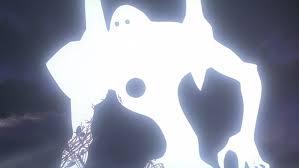
Adam’s soul lies within Kaworu. Adam. Who utilized an Anti-AT Field which caused Second Impact. An Anti-AT Field, which killed off much of the Katsuragi Crew in Antarctica.
This makes Kaworu the most powerful angel in the original Evangelion series.
Eva has shown that ownership of an angel’s soul (or partially, if you’re onboard the Rei I is in Unit-00 theory) allows the person to inherit the angel’s abilities through Rei. Rei blocks off Kaworu’s immensely powerful field with one of her own, canceling out both as a result. As we know, AT Fields for people are a figurative affair. People lack the physiology to exhibit a physical AT Field because they don’t have cores like angels do. Angels’ souls when possessed by humans have a sort of ability to circumvent parts of human physiology (if you’re looking for the whole package, you should eat angel’s flesh too). Rei also shows the ability to float, implied in episode 24 and shown explicitly in End of Evangelion.
But this raises a few questions about the last messenger is the ability to block out some of the forces of the universe Adam’s powers or Kaworu’s? Another ability that continues to plague me the more I think about it is Kaworu’s AT-Field usage on Heaven’s Door to bypass its lock.
We haven’t actually seen Adam’s other powers (if the angel has any) because the it’s anti-AT Field was halted via Lance of Longinus. Other than its ethereal appearance in flashbacks, we only see an incapacitated Adam in embryonic form. That’s it. We don’t know if Adam exhibits any other powers due to this impediment. If Adam does have more powers, this would add onto both the fridge horror factor of Adam and Kaworu.
Tier 4: Pre-Abyss

XIV. The “Nihilist” Lens
XV. The True Nature of Sync Rates
XVI. Unit 01+ MPE Gorging Scenes
XVII. Ancient Ruins of Arka
XIV. The “Nihilist” Lens
There’s something that implicates the whole cast. Something that goes beyond the meaning of the AT-Field, and the all-too-known Hedgehog’s Dilemma.
Eva is filled to the very brim with psychological concepts, but there’s one thing which ties this all together. It goes much larger than the desire to become validated or cycles of abuse and unresolved issues to a newer generation.
Free Will Vs. Determinism ties the entire cast together and is disturbing in its own right. It not only ties the cast together but also contributes to Eva’s meta-narrative.

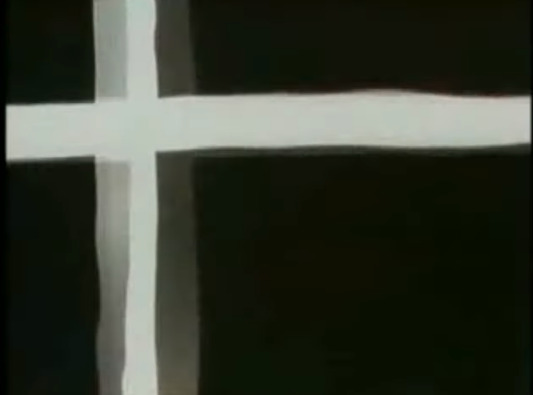
Episode 16’s sequence with Leliel, Shinji, and the Johari Window gives little breadcrumbs to this psychological dilemma. Leliel teaches Shinji about his own identity as well as slowly ushering him to a sense of self-awareness. Leliel also attempts to usher Shinji out of filtering reality with only convenient parts. Shinji argues that he can’t really be held culpable for his actions, because the one and only reality is that reality is awful, bar none. Not his reality, but reality as a whole. This deterministic stance becomes ever more blatant 8 episodes later with the appearance of Nagisa Kaworu.
Kaworu’s designation is the angel of free will. The irony of this stands in the fact that Kaworu isn’t the only angel who can exhibit free will (with some of the angels before him taking the time to try comprehending people). Kaworu’s status comes from his identity as the last messenger, bringing about freedom for one species (humans/lilin or angels) at the expense of the other. Kaworu knows his reality well and in the end, seeks to better the reality of those around him. Eva doesn’t romanticize the prospect of free will, however, because Kaworu is so aware of his own person and how he can hurt those around him that it greatly bothers him.
The metatext doesn’t just position Shinji as being in the wrong, but also the audience. Remember the point I made before about Shinji being the audience substitute? It’s further hammered home from the series’ tail end and into End of Evangelion.
“That’s just the way things are.” is a common response to things in life we feel resigned on changing, because we don’t know how to change them. This quote is a parallel to Shinji’s “humans aren’t made to float!” in episode 16.
Shinji does know how to change much of his reality, but by doing so he’d be pushed into free will. Free Will is the solution and it means holding yourself accountable rather than believe that it’s everyone else with the problem. With the idea that you can change your reality, it offers you the opportunity to love yourself.
If you love yourself, then it becomes much easier to love others.
Eva’s free will and determinism metatext hammers home the extension of empathy.
Shinji/the viewer’s greatest problem is that because we don’t love ourselves it makes it difficult to extend the love to everyone else. Shinji’s love translates as idealism. Because of his unhealthy idealism, he is hindered from understanding people.
By ascribing your beliefs from determinism to free will, it opens your mind to an entire world of possibilities, but therein lies the terror. It is because of these possibilities that Shinji and by extension, the viewer, likely fears free will. Shinji finds ways make himself validated, but with free will, the argument could be made that it doesn’t matter. There’s the anxiety-crippling likelihood that none of it actually matters, because your existence doesn’t matter. If we’re going on this bent, acts of making an adequate impression on others are acts of personal denial. In the end, these are what they are, possibilities.
The greatest terror of it all is that we don’t know.
User power-chords makes an excellent point about the inherent darkness of an internal locus of control.
User power-chords posits the idea of existential absurdity for Shinji not as a certainty but a possibility. There’s always a likelihood that our desires to comprehend the world around us, to find ultimate understanding are in vain.
Cheesy as it sounds, people fear ambiguity because we seek a satisfying end. We don’t just seek answers. We want outside closure and inner peace, but we won’t always get it. It’s why we rationalize relationships that end on bad notes. Sometimes you worry about your falling-outs...and it hurts. You never got the answers your wanted so this pain carries, for months, sometimes even for years. Dwelling on the issue serves no purpose other than to keep that hurt with you. The best thing to do sometimes is to find your own closure, your own meaning.
No, Evangelion isn’t actually pro-nihilism, but it presents us with that likelihood. That’s what makes this aspect of the narrative so terrifying: The consideration that we find meaning in the meaningless.
XV. The True Nature of Sync Rates
The nature of injuries and having them in adds onto the innate horror --be it war or otherwise-- and themes of the Evangelion. The severity of the injury is based on how high the pilot’s sync ratio is. An average rate while sustaining damage will bring hurt to the actual pilot in the respective spot. Some examples:
Sachiel makes multiple headblows to Unit-01 and Shinji in episode 2, causing head trauma.
Ramiel’s, (5th angel), particle beam attack in episode 6, an attack so severe that Shinji needed medical care.
Unit-00 and Rei being infected by a Bardiel hijacked Unit-03 in episode 18. Toji’s condition in episode 18 stands as a large example of the innately disturbing nature of sustained injuries.
Toji’s condition becomes all the more nauseating when you see Evangelion parts and blood flow through Tokyo-3.
Toji could feel every last second of strangulation, body blow, and feel the unspeakable pain of his arm being severed. Let that sink in.
Asuka receives the worst of these considering the nature of her sync rate being high. The higher the rate the more kept the damage is. The circumstances behind Asuka getting the worst of it goes back to the AT-Field. Asuka understood the meaning of the AT-Field, that the more you open yourself up to others, the more hurt you become. The realization dawns on Asuka as her mother from within the Evangelion shields her from the onslaught of JSSDF troops.
It’s then that Asuka finally comprehends what the Absolute Terror Field is. Despite her emotional needs being neglected, realizing she’s set up to fail, and going comatose she still goes on.
Asuka, despite everything, takes a chance and opens her heart knowing the double-edged nature of the AT Field. What happens next?
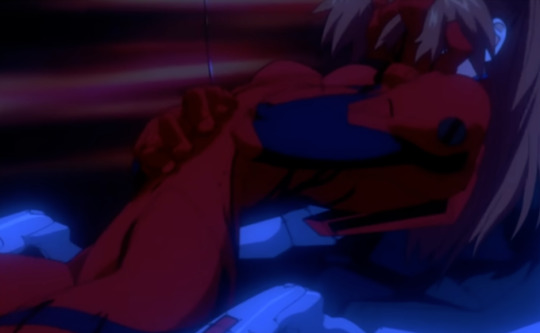
Asuka took a chance.
She opened her heart...
...and she got hurt all because she opened herself.
XVI. Unit 01+MPE Gorging Sequences
The brutality of both Unit-01 and the Mass Production Evas holds three layers: of visual horror, implied horror, and thematic horror. Unit-01, after taking Zeruel’s s2 engine into herself, proceeds to then brutalize the 14th angel by way of still gorging on it. The feeding was entirely recreational considering Evangelions don’t subsist on food to function. This was more about the sheer act of brutality for brutality’ sake.
The Mass Production Evas also fall under this category, the way in which they deal with Asuka after incapacitating her with a replicated Lance of Longinus is also sadistic and gratuitous. They also proceed to gorge on Asuka, her fate made worse through the simple fact that her sync rate is heightened.

The MPEs don’t even swiftly finish her off. She is in a state of tremendous and unimaginable pain. They fly above her slowly, circling above her mangled Eva.
They are almost mocking her as she can do nothing, save for writhe. Asuka’s seething, repeated “I’ll kill you...I’ll kill you….” is then silenced by the MPEs spearing her down.
The brutality doesn’t end there, as we see much darker implications of the damage sustained toward the end of the first half of End of Evangelion.
Shinji bears witness to the implications after seeing the decimated remains of Unit-02 being carried off by some of the Mass Production Units. The sickening reality of it all dawns on him and he is once more exposed to the woes of war and the nightmarish aspect tied of the Evangelions.
XVII. Ancient Ruins of Arqa
We’re ending the pre-abyssal end of the iceberg with Evangelion’s original proposal.
Eva’s proposal, a far cry to the show today, had a more sci-fi angle to it. Psychological concepts weren’t exactly pitched nor was it self-aware. The angels weren’t even referred to as the angels, but as the Apostolos. Instead of the 18 we were presented with in the original show and the movies, there were 28 Apostolos.
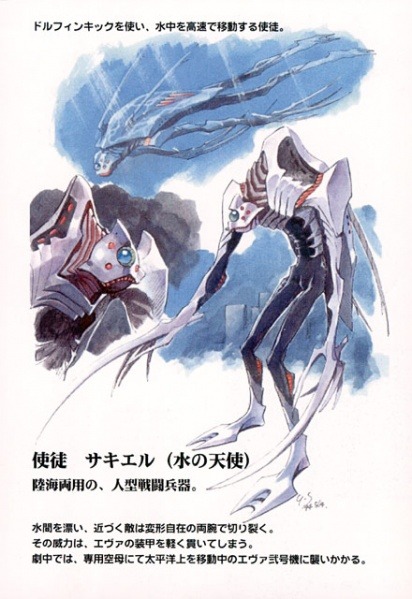
The Apostolos designs stand as testament to how far of a departure the proposal was to the final cut. They look far more menacing than the more amorphous, much softer defined, beady-eyed angels we’re used to. To top it all off, the Apostolos were the de facto villains of Evangelion’s prototype pitch. The Apostolos in the Proposal, toward the end, proceed their onslaught as a group rather than the series’ one by one. Toward the series’ end, the 12 strongest Apostolos begin their assault on North America, annihilating the continent in its entirety.
Only 12 of the creatures laid waste to a singular continent.
Episode 24: "Now, the Promised Time"
Rei breaks down. Her secrets are revealed. At last awakened, the twelve strongest Apostolos descend from the Moon. Both Eva Unit-06 and the American continent vanish completely. Humans acknowledge their helplessness in the face of the Apostolos' crushing power. The promised time, when people will return to nothing, approaches. A human drama in the depths of despair.
Episode 25: "Arqa, the Promised Land"
The laboratory holds the ancient ruins of Arqa, which have become key. In order to stop the twelve Apostolos, the United Nations' head members annul the Human Instrumentality Project and resolve to destroy the Apostolos. Shinji's father objects. Shinji and the others stay at the laboratory for Rei. A drama of people conflicting over incongruous objectives.
https://wiki.evageeks.org/Resources:Neon_Genesis_Evangelion_Proposal_(Translation)
The aforesaid creatures were so powerful in the original pitch that Human Instrumentality and the ancient ruins of Arqa would be the way of stopping the onslaught.
Tier 5: The Abyss

XVIII. Split Second Misato Death
XIX. Humans Are The Villains in Eva
XX. The Ultimate Paradox
XVIII. Split Second Misato Death
As the last and most explicit aspect of original Evangelion, it would only make sense that EoE specific content would take its place in Tier 5. End of Evangelion is a 90 + minute tour de force with disturbing imagery back-to-back. Split Second Misato Death refers to one of the most unsettling images sprinkled all throughout the movie. Here are a few of the many examples of EoE’s building up on Evangelion’s ugliest parts.
Everyone cites the infamous hospital scene not even 5 minutes into the film as the first proof, but user power-chords has pointed out, Shinji has actually attempted suicide (refer to the ‘Free Will v. Determinism’ part of the iceberg.)
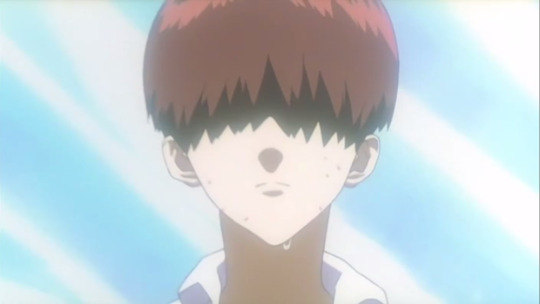
After Misato is mortally wounded and sends Shinji off in an elevator not long after, the JSSDF blow up that part of NERV. A few people have pointed out the most disturbing facet of this scene: through freeze-framing that you can actually see Misato’s body during.
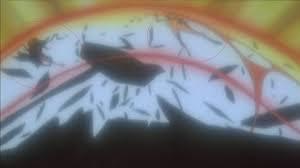
The JSSDF scene partway through End of Evangelion in which NERV personnel are summarily annihilated.
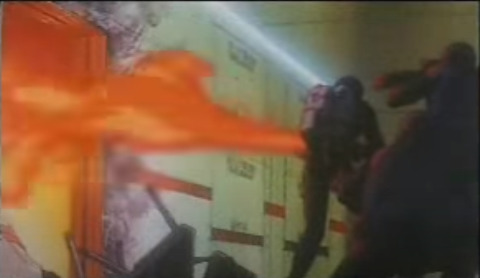
For those missing the small detail of Shinji’s attempted suicide ,Shinji’s depressed state is made more clear when the JSSDF locate him. When they do they attempt to kill him execution style. Shinji doesn’t move.
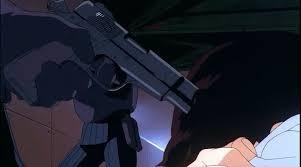
“I don’t want to die…!” during the JSSDF’s assault, Asuka is awoken from comatose state. She is protected by her mother via an AT-Field by Unit-02. She gains back her self-preservation after this realization, and multitude of images play. One of them is an extremely gruesome close-up of Asuka’s face. (extreme body horror warning, proceed with caution)
The Komm Susser Tod scene beginning with Shinji strangling Asuka in harsh coloring, Naoko’s same action toward Rei plays right after. A few disturbing child drawings follow after, predominantly featuring death. (seizure warning, body horror warning)
End of Evangelion’s flooring nature comes from the fact that it builds up on the subtly horrific and makes these terrors explicit. Whatever existed beyond closed doors becomes now available for us to see,
XVIII. Humans Are The Villains in Eva
At the penultimate point of the abyss lies a horror as old as much of time. Of the humane being more disgusting than the monsters.
That we can be monstrous.
This fact becomes known with the appearance of the JSSDF as dispatched by SEELE, methodically mowing down NERV personnel with little to no weaponry of their own. We’re treated to NERV’s personnel in their hallways, some forced with the moral dilemma of leaving their own to die while surviving or helping their own while both end up being gunned down.
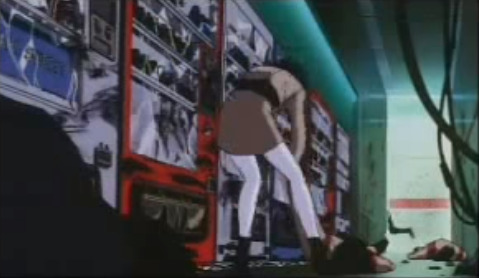
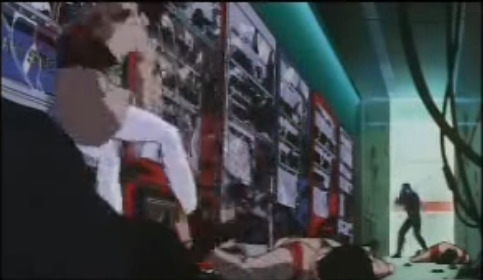
It becomes apparent that SEELE has been gradually, intentionally chipping away at NERV’s Defense Budget, getting rid of the (little) competition they have after the defeat of the Last Messenger.
There’s a degree of contempt and casual sadism that comes with how they kill the personnel. In one instance, a NERV worker surrenders to the JSSDF, before being killed off in execution style in the distance (one headshot plus two extra shots for good measure).
When you look back at it, this sort of sheer, unabashed brutality wasn’t felt about the angels. Human attitude about the angels is largely fearing, anxious. This attitude accentuated itself through a sometimes nervous soundscape. Of observing these weird, ghastly creatures as they creep and swim. And the feeling’s mutual. The problem is that we don’t know.
But here? We do know.
When the JSSDF move in, the anxiety of angels graduates to the full-force dread of creatures that have killed before. The greatest enemy to humanity has always been with them all along, forcing them to a catch-22. The dread falls on Maya because she understands this perfectly. NERV has only ever shot at targets rather than living flesh…
...and SEELE knows this.
SEELE’s slow, but sure suppression of NERV’s budget is kicking a man while he’s down, but the man in question is a child instead. The JSSDF have more than enough firepower, calling it overkill goes beyond an understatement.
The JSSDF demonstrate the lack of remorse further with the discovery of Third Child, Shinji Ikari. One of the members presses the barrel to Shinji’s head before Misato steps in and kills the members.
The JSSDF isn’t the only damning evidence of how ugly members of humanity can be, however.
Humanity’s on-occasion grossness shows itself in small ways throughout the series, in dislike and conscious emotional distance for individuals, or beliefs of the angels being unintelligent and/or savage. Other times it manifests fiscally, in orchestrating more ethical approaches to stopping certain destruction to go seemingly haywire in order for NERV to receive more funding. This all due to a rival company of NERV challenging the very idea for its usage of child soldiers.

The worst of this damning fact is that many of the morally repugnant members exist on a higher echelon of society. There are Gendos running around, doing as they so please and they’re the tip of their echelon iceberg.
XIX. The Ultimate Paradox of Evangelion

“Anywhere can be paradise as long as you have the will to live.”
We’re treated to these words as Shinji finds himself on shores surrounded by an isolate hellscape, with Asuka next to him. The strange and altogether horrific nature of End of Evangelion has gotten fans believing on End of Evangelion’s endgame was in certain, nihilistic. But Eva dipping its hand in the likelihood of meaning in the existentially meaningless isn’t even the ultimate terror of Eva’s self-aware universe, nor is it the tendency for man to become contemptible towards itself.
Evangelion greatest terror is the paradoxical nature of free will.
Yui’s words to her son as she drifts off into the ever-expanding cosmos, her status as a deity realized, is that paradise is universal. EoE assumes this unconventionally positive approach to a whole series worth of characters’ woes. The issue is: finding paradise is ultimately conditional.
Free Will’s paradoxical nature is what gives credence to the ongoing Free Will vs. Determinism dilemma. People can use their free will to take away yours entirely and this is most evident with Rei. Her existence is the result of a man’s unhealthy attachment to his wife, her lack of self-preservation the result of being conditioned as a multi-purpose vessel; her desire to merge with Lilith to become an omnipresent mother-figure was not hers. The nature of disallowing free will exists on a spectrum, as people can use their free will not to take away the whole of others’ freedoms, but to disallow them proper emotional growth. The adults around Asuka weren’t around for her during the series, leading to her eventual downfall.
Unit-01, throughout much of the second part of EoE holds the power to give or deny people’s physicality due to her status of having both Fruits of Life (the s2 engine held by angels) and Wisdom (from the Lance of Longinus merged with the Eva earlier on). This gives Unit-01 her deity status and while within Lilith-Rei, Shinji realizes that not everyone would be there in his life, that he can’t be in the center of others’ lives. It’s for that reason why he denies people’s physicality (“They can all just die.”), which turns people into LCL.
Shinji gives allows people the ability to come back from Instrumentality after realization arises that without other people, there’s no way to tell if Shinji, himself exists or not. Kaworu and Rei also give him the reality that with people back, pain will become an inevitability once more. With all the souls gathered by Lilith-Rei, they are released after her death.
With the souls of those cast into Instrumentality dispersed, those turned into LCL now hold the ability to come back from Instrumentality if they so choose.
While the idea of anywhere being paradise rings true, it’s not entirely satisfying to say that EoE is unconventional in its uplifting message to the viewer. Evangelion is at its core a cautionary tale. It warns the viewer into extensions of empathy and openness that others would properly live. This goes double for those with power. Without that compassion, we’ll have Asukas, Misatos, Ristukos, as well as Reis, those in the world whose downfalls come from emotional absences, neglect, objectification, and forced baggage. We would have Shinjis, those wanting to be at the nexus of others’ importance because they were deprived while young.
Kindness is a powerful thing and the lack of compassion present in all of Eva implicates most everyone. It leads to yet more abusive cycles, with the only thing breaking that cycle being a hand for those in need.
XX. Conclusion
What more can be said over this juggernaut which is a host to a bevvy of darkness? Evangelion is testament that anxieties and horror don’t need to start out as blatantly shocking or visceral to make an impact years down the line. They also don’t need to be out in the open to initially hook you either. You pick up on a few anxieties as well as horrors and you realize deep down, there must be more, which drives many of us to engage in this often times unabashedly dark source material.
Some of us are doing it later in the throes of adolescences, others are doing so well into their 20s, possibly dipping into their 30s. Point is, it draws in a lot of us and for a lot of us, it doesn’t ever let go.
Some of its charm could be chalked to the visceral ways in which characters interact. Even after years of re-watches, I’m still learning new things about the child soldiers, and I’m quite sure there’s others finding small details. There’s also the possibility of Eva’s approach to terror. I think Evangelion “humanized” its horror. It didn’t make horror a universally human feeling, but made it so that the true big bads looking to cause apocalypse weren’t actually the eldritch. Many of the angels are more or less lost kids looking for their mother (I still think Ramiel’s “singing” in episode 5 was it calling for its mother!).
With those newer details after 20+ years, there will be more added to the iceberg. Hell, there should be more added to the iceberg. This iceberg is the tip of an even greater iceberg. I’m still learning about their adults and their desires as well, how cyclical their actions are. For others, the draw-in factor lies in its low budget. Personally, it’s all of these for me: the low budget helped cement these darker aspects of the series due to horror and the genre’s overall relationship with limitation. It works best on limitation and had Eva worked with a much higher budget, I don’t think the content would be as effective, or perhaps it’d be much more difficult to make it so.
Evangelion is such a well-done, deceptively compact series that each lens a fan assumes has its own interesting rabbit hole. Your circumstance shapes the experience, and this too involves how you navigate the series’ menagerie of terrors.
I’d also like to thank the reader for getting through the largest rabbit hole in Evangelion. I’d also like to thank you for getting through the whole of this meta from a fan who slowly began to resonate with the characters as the years went on!
#neon genesis evangelion#shinji#kaworu#asuka#rei#seizure warning#body horror warning#suicide mention#correct me if im wrong#credit goes to twitter user decoratedboar for the iceberg picture help#and fixes
3K notes
·
View notes
Note
Heyy, congratulations on 50 followers! Could you write something for Finnick Odair (fluff with a little bit of angst?) based on the lyrics "How would you feel, if I told you I loved you? It's just something that I want to do, I'll be taking my time, spending my life, Falling deeper in love with you, So tell me that you love me too" from 'How would you feel' with a female reader. Please make whatever changes you want, absolutely adore all your writing :))
Ok so I loved this request because I love Finnick so much!! I really hope you like this! I'm sorry I took a bit longer to write this, I had a lot of uni work and studying to do this week.
requested by @boxofsilentwords
This is my first Finnick fic, so I'm nervous... Any and all feedback is more than welcome!
Pairing: Finnick Odair x Female! Reader
Song: How Would You Feel - Ed Sheeran
Warnings: Mentions of killing (nothing graphic), swearing, the hunger games, pining, fluff. Just before the 75th Hunger Games (Catching fire book/movie), but I changed the plot a bit so it would fit the story, Mags doesn’t go with Finnick, the reader does.
Word Count: 1,2k
Divider made by me on @promenadewithme-graphics

How Would You Feel
There were soldiers surrounding all the victors as you got up on the platform. Your whole body was shaking. ‘Why is this happening? I already won! I’m not supposed to be here’. You looked to your right and saw your best friend, Finnick Odair, and 3 other male tributes. To your left was Annie Cresta and Mags, who was squeezing your hand.
“As always, ladies first!” said the district 4 escort with a wild grin. You don’t understand how they slept at night, sending people off to fight to their deaths every year, watching like it’s fiction. These were real people, who had families, lives, dreams. You had dreams.
The escort grabbed one of the envelopes and walked back to the microphone.
“Let’s see...” he opened it and with glee he exclaimed “(y/n) (y/l/n)! Come on over, dear!”
You looked at Finnick with desperation in your eyes before giving Mags’ hand one last squeeze and walking away. You felt like the world around you was shrinking, like there was no air to breathe. The escort’s voice was but a whisper until your heard what you dreaded more than your own death.
“Finnick Odair!” you looked at your best friend with fear in your eyes. Most would be happy to go into the arena with an ally, but this was Finn. This was your Finn. Well, you couldn’t exactly call him yours, you two were just friends. But you have always loved him. Despite his many lovers, you always stood by him, hoping he would see you. He never did.
“May the odds be ever in your favour.”
‘And let the hunger games begin’ you thought, looking over at Finnick. He was looking back at you with a plain face, but you could see the pure terror in his eyes. ‘The arena messes with all of us, no matter how tough or brave you are. What happens when you go in twice?’

“And those two are Katniss Everdeen and Peeta Mellark from District 12, they won last year’s game.” depicted your escort. You and Finnick were staying at the tributes building. Fourth floor for district 4, as per usual. Over the past days you had come to terms with the fact that you were going back into the arena. That didn’t mean you weren’t scared shitless.
“What else do you know about them?” asked the man. You had watched the games last year. For the first time, you actually liked the victors. So you exposed what you knew.
“Katniss is a hunter, excellent with a bow and arrow, great survival instincts. Peeta is very strong and good at camouflage. The two of them are getting married. Well... at least they were before all this.” you frowned and Finnick scoffed.
“Do you seriously believe that they are in love? They must be jumping with joy that they get to call it off.” he shook his head.
“What do you mean? You saw the games last year, they are obviously in love. They were going to die together.” you refuted, turning to face him.
“Please! The two tributes that are chosen are actually secretly love each other to the point that they would die for one another, they both win the game and live happily ever after? This is the real world, (y/n). These things don’t happen.”
Your heart tightened, but he was right. The couple had given you hope that maybe Finnick would love you too, that even the worst situations could bring some sort of happiness. You now realised it wouldn’t happen. Your love was unrequited, the two of you were going to the arena, but only one of you would come out. If both of you weren’t killed, that is.
“You’re right, they don’t.” you frowned. Your escort continued to talk about the games and how to look good in the eyes of the public, but you didn’t care. It’s not like you’d make it out alive a second time. You barely did the first, in the 66th hunger games.
You went in a year after Finnick, you were so young and so was he. Maybe that's why the two of you bonded in the first place, having to be strong so early in life isn't something easy. Having to carry the weight of killing that young isn't either.
"Excuse me." you muttered before going to your room, Finnick following suit.
"What's wrong?" he demanded.
"What's wrong? Are you seriously asking me that? What's wrong?!" you exclaimed. "What's wrong is that we already went through this. What's wrong is that this happens every fucking year and no one does anything to stop it. What's wrong is that I am terrified that I'll die, or even worse, that you'll die. Because I don't think I can live without you." tears were streaming down your face as you continued, voice getting lower with each sentence "What's wrong is that I am head over heels in love with you, have been for years now by the way, and you never even noticed me."
You gasped and covered your mouth. What have I done? you thought as Finnick looked at you in shock.
"What?" he mumbled.
"Nothing, just please forget I ever said anything." you begged, going into the bathroom. Yet again, Finnick followed you.
"You love me?" he gawked.
"No?" you tried answering, but it came out sounding like a question. You wanted to dig a hole where you could hide, you were mortified. But when you looked at Finn, he was grinning.
"You love me!"
"Oh God." you hid your face in your hands "Please don't tease me about this."
You felt a pair of hands on yours, removing them from your face.
"Look at me." he whispered. You hesitated for a second, but did what he said. He was smiling softly at you.
"How would you feel if I told you I loved you?" he asked and it was your turn to be shocked.
"What?"
"It's just something that I want to do. Well, I've been wanting to do it for a while now. I just didn't know you felt the same." he confided and you grinned, but it quickly turned into a frown.
"What do we do? The games- We..." tears were forming in your eyes again. He put his arms around you in a tight hug.
"I'll get us both out, I swear I will." he vowed.
"You can't promise me that, Finn. There can only be one victor."
"There was an exception last year, why can't we do it again? But that's no what I'm planning. There's- " he stopped for a second "I can't tell you right now what I know, but I promise we will get out. And after that," he smiled at you, caressing your face "I'll be taking my time, spending my life, falling deeper in love with you. So tell me that you love me too."
You wanted to argue with him, make him tell you, but you didn't want to ruin the moment. So, you put your head on his chest and let him hold you.
“I love you, Finnick.” you mumbled into his chest, wishing it could last forever. Wishing you didn't have to go back to the arena or at least that the odds would truly be in your favour.

General tag list: @for-bebbanburg @power-of-words23 @elenapatricia99
The Hunger Games tag list:
Finnick Odair tag list:
tell me if you want to be added to my tag list!
#finnick odair#finnick x reader#finnick imagine#catching fire#finnick odair x you#finnick odair x reader#finnick odair fanfic#finnick odair x fem!reader#fem!reader#female!reader#anastasia's 100 followers celebration#anastasia's 50 followers celebration
302 notes
·
View notes
Text
SJM setting up a forbidden romance
(And why I think ACOSF was written to set up Elriel)
This is my interpretation and obviously an Elriel post. So if that's not your cup of tea, be warned.
I made this post to basically organize my thoughts and then I decided to post it (lol). Here I talk why I think Elriel will be endgame based on my perspective that SJM already set up a lot of things that point to Elriel and a forbidden romance.
ACOSF is the first book of a new trilogy, which means SJM wrote it with an overarching plot in mind that we began to know in ACOSF. So whatever happens in ACOTAR5 is a direct consequence of the events in ACOSF.
For example, SJM won't kill Koschei and write another plot. She made her decisions when she was writing ACOSF and the overarching plot already started to be established.
I already made a post talking about the plot. I think Elain is the only character that can move the plot forward, because she's Made, therefore she can find the fourth trove and she has a connection with Koschei, which combined with how little we know about her and her powers makes her the perfect main character. But here I want to talk a little about how Sarah wrote ACOSF preparing Elain's character in terms of romance and how she set up a future forbidden romance.
At this point, it is canon that Elain is Azriel's secret, I'm not going to talk too much about, because you can check this amazing post here.
SJM structured the first book of the new trilogy around the ideia that something is deeply tormenting Azriel to the point he can't sleep and then we find out he has a secret. The bonus chapter made it canon: his secret is Elain, so there's no going back from that.
Just from the book, we know that there's something wrong with Elain and, whatever it is, she is hiding it.
Elain had already departed with Feyre, claiming she had to be up with the dawn to tend to an elderly faerie’s garden. Cassian didn’t exactly know why he suspected this wasn’t true. There had been some tightness in Elain’s face as she’d said it.
Alright, so the regular reader knows something is up with these two characters. (That alone is already a reason for the next book be about them, but moving on)
But when ACOSF is read with the perspective of a future forbidden romance in mind, we understand precisely why SJM needed us to know some very specific information.
Azriel's personality traits
SJM highlighted specific personality traits of our bat boy:
Az had a vicious competitive streak. It wasn’t boastful and arrogant, the way Cassian knew he himself was prone to be, or possessive and terrifying like Amren’s. No, it was quiet and cruel and utterly lethal. Cassian had lost track of how many games they’d played over the centuries, with one of them certain of a win, only for Az to reveal some master strategy. Or how many games had been reduced to only Rhys and Az left standing, battling it out over cards or chess until the middle of the night, when Cassian and Mor had given up and started drinking.
Sarah made a show to tell the reader the fact that Azriel is competitive, so she needs us to remember that.
That whole scene had one job: to emphasize that Azriel is competitive and strategist.
Now, if Azriel is giving up on Elain and moving on to another character, why bother to let the reader know he doesn't give up easily? If he is going to just give up on the only female that is making him get over his five hundred years passion, why bother to write a scene where he spares with Cassian only to tell the reader that?
Mostly important, why tell the reader that in countless times, Azriel seemed to be loosing, but he turned things around and won?
He's a strategist. Don't forget he planned his strategy for the snowball fight for a year.
“It seems you’ve forgotten how much of spying is waiting for the right moment. People don’t engage in their evil deeds when it’s convenient to you.”
Cassian rolled his eyes. “I stopped spying because it bored me to death. I don’t know how you put up with this all the time.”
“It suits me.” Azriel didn’t halt his sharpening, though shadows gathered around his feet.
When I read this for the first time, I honestly hadn't understood the meaning of the shadows gathering around his feet and it clearly had a deeper meaning.
But reading again, SJM used Cassian's character to emphasize that Azriel waits for the right moment all the time. Not only when he is spying. Being patient, calculating, persistent are arguably Azriel's strongest personality traits, at least the ones that are highlighted in ACOSF. Sarah is letting us know Azriel plays the long game and doesn't give up.
Every information SJM is giving us regarding Azriel (and Elain, more on her later) is essencial for a forbidden romance story. If you know what's going on with these characters, all pieces of information just... click together.
Elain's personality traits
This is a bit more complicated, mostly because Elain is passing through an inner change, which means being prepared for her arc.
However, SJM compared Elain to Azriel in ACOSF:
“Elain was the only one who guessed. She caught me vomiting two mornings in a row.” She nodded toward Azriel. “I think she’s got you beat for secret-keeping.”
We already know from ACOMAF that Elain is good at secret-keeping. But here SJM not only reminded us that, but she compared Elain to Azriel in secret-keeping, emphasizing both of them are probably the best in secrecy among the IC.
Remember: these two characters are clearly hiding something in ACSF. It's not a coincidence that SJM compared them in this case.
She scanned Elain from head to toe, wondering if she’d been taking lessons in stealth either from Azriel or the two half-wraiths she called friend.
SJM compared Elain's abilities to Azriel's (and his spies) not once, but twice. And if you take into consideration the previous books, it's not the first time she compares these two characters.
Both of them showed defiant behavior
Defiant: refusing to obey authority
Elain:
“What happened.”
When Rhys spoke like that, it was more of a command than a question.
Elain waved a hand in dismissal before flinging open the veranda doors and striding into the open air.
And of course, he have that fight with Nesta. Nesta isn't exactly authority, but she was described as "Elain's guardian", which means their relationship was at least a little hierarchical.
Azriel:
“No,” Feyre and Rhys said at the same time, in the same breath.
Azriel’s eyes shuttered. “I wasn’t asking for permission.”
“We take no risks,” Feyre said, voice flat with command. “Pull all your spies out.”
“Like hell I will.”
Honestly, is this the guy people are thinking that's going to give up on Elain because of Rhy???????
SJM deliberately let us know about them getting over their previous LI
I've seen a lot o people arguing that "they can't be endgame, because the first couple never is".
But... are we forgetting that they were in love with two different people before?
When Elain met Azriel she was deeply in love with Graysen, and he was still into Mor. The readers didn't even know about Mor sexuality then.
Until ACOFAS, we can see that both of them are not entirely over their LI yet.
Elain:
“I don’t want a mate. I don’t want a male.”
She wanted a human man.
Azriel:
Azriel choked on what I could have sworn was a laugh, his normally shadowed face lighting up as Mor bustled in.
Az, to his credit, gave Mor a smile of thanks, a blush creeping over his cheeks, his hazel eyes fixed on her. I looked away at the heat, the yearning that filled them.
However, we get to see that they are slowly getting closer. Azriel shows he's uncomfortable in spying on Lucien, Elain's throat bobbs at the sight of him, he seeks her out to wish happy Solstice, she gives him a present, they stay up past three in the morning talking and on and on.
Months go by. We already knew they are getting closer and then we have this:
Elain:
She knew Elain had given her maidenhead to Graysen a month before they’d been turned Fae. Elain had been glowing the next morning.
Elain cocked her head. Didn’t dissolve into the crying mess she usually became when Graysen came up.
Elain was glowing: she was in love, happy. She loved Graysen. And now she is getting over him. Not only that: SJM made sure to tell us she has had sex before (and enjoyed very much lol). Elain is clearly being prepared for her arc in terms of character development, plot and romance.
And Azriel:
Mor no longer sat beside Cassian, draped herself over him, and Azriel … those longing glances toward her had become few and far between. As if he’d given up. After five hundred years, he’d somehow given up.
Few and far between. It's a process for both of them to move on. At first they were friendly and then it became something more.
Azriel didn't wake up one day, realized that his brothers were mated to Elain's sisters and went: WAIT A MINUTE I WANT ONE. I would argue he showed interest in Elain since their first meet, just like Cassian showed interest in Nesta. However, Nesta and Cassian weren't in love for anyone else, differently from Elain and Azriel.
Also, Elain and Azriel are very much quieter in comparison, so... it makes sense that they needed more time to get closer and be romantic interested in each other.
But again: why bother to tell us both of them are moving on from their previous LI? Why tell us Azriel doesn't give up easily? Why tell us they are both good at keeping secrets and are hiding something?
SJM knew exactly what she was doing.
281 notes
·
View notes
Text
Something I love about Obey Me is that, on the whole, for every trait a character has, they have another trait that actively counters it and thus makes them seem genuinely conflicting on a surface level, but wonderfully three dimensional on a deeper dive into their character.
E.g. People in the early-game sometimes think Diavolo comes across as a little two-faced, or that there’s something a little suspicious about him and the things he does - and I def. originally saw some theories (and when I first started playing, had some suspicions of my own) that he might end up being the real “villain” of the game.
A lot of this stems from the fact that he seems genuinely friendly, open, and willing to spend time with the exchange students in casual, informal ways, but also has abilities and moments of power abuse that seem to completely diverge from the image of the smiling prince.
Surely someone who does this is hiding something? Surely that carefree attitude is just a facade? It’s definitely the sort of twist you could expect with the character setup present in Diavolo.
But when you look at it, there’s a reason behind this duality that doesn’t actually fall into the usual tropes - and instead builds a much more interesting, well-rounded character.
(Spoilers ahead, both for Lesson 16 and for the most recent Lessons, especially involving Diavolo’s childhood.)
For instance, how could he claim to see Lucifer as a friend when he has him bound by an Oath that puts an incredible power imbalance in their relationship, and stops him from speaking of it?
The answer is that he’s genuinely never had a friend in his entire long life that hasn’t had some form of reason to stay by his side. To Diavolo, the Oath was a way of ensuring Lucifer couldn’t leave - not a way of keeping control. He wanted Lucifer to be his friend, has been enamoured with him even since Lucifer was an angel, and took the opportunity to secure that friendship in the only way he knew how.
Because Diavolo is pitifully lonely. Because Diavolo was raised in a way that left him incapable of making friends. Because Diavolo likely never would have been able to make a friend if he hadn’t tethered them to him.
Does this make the Oath any better? No. He took advantage of a broken, freshly fallen angel, terrified of the fates of his siblings, and vowed him to silence and servitude in return for their lives.
But does this mean that the Oath was inherently evil? No. At its core, the Oath was the act of a very lonely man realising he had a chance to secure the one thing he wanted more than anything. It was selfish, but not evil.
It does, however, show us the sort of extent Diavolo will go to get what he wants. He will leverage something over others if he thinks that’s what it takes. This is even reinforced by the truth of Barbatos’ servitude; that he treatened to refuse ascension to the throne if Barbatos didn’t stay.
At the same time, it shows that what he wants, more often than not, is something harmless, if desperate. It’s often a desire for companionship that spurs him into dubious action.
He’s very unlikely to abuse his power to genuinely hurt someone, but he may use his power in a way that has hurtful side effects.
Diavolo is aware that his actions had consequences, and feels guilt. He still isn’t confident that Lucifer and Barbatos genuinely want to stay with him or in his service, and he’s openly aware of the fact that Lucifer, at the very least, doesn’t see them being as close as he does.
He doesn’t want to remove either of them from his service for fear that they really will leave him, but he’s aware that keeping them there potentially against their will isn’t conducive to healthy friendships.
Diavolo has done dubious things for selfish reasons. This is undeniable. But those reasons are genuine and understandable, and something players can easily sympathise with.
That’s the sort of thing you want for a well fleshed-out character; the ability to say “there was something inherently wrong in this action taken,” but also say “I can understand why he took the action, even if it was wrong”.
I focused on Diavolo for this, but here’s another two points I can think of to further illustrate the point:
- Lucifer’s genuine love and care for his family constrasting against his prideful brutality and absolute loyalty to Diavolo above all else (e.g. how he can justify locking Belphie up in the attic. This was an act of love. The alternative was to hand Belphie over to Diavolo and let him face an unknown fate. By locking him up for the duration of the Exchange Programme, Lucifer was working to avoid being disloyal to Diavolo and being disloyal to his family. It was absolutely an imperfect solution. It absolutely had its flaws. It absolutely made things worse. But it was his way of keeping his youngest brother alive and allowing Diavolo’s dream to come to fruition. A dubious act founded in good intentions.)
- Satan’s kind thoughtfulness and amicable nature contrasting against his Wrath and how it affects his brothers (e.g., how he can switch between fretting over Beel’s mental health in one chat, to being so furious with him over his Gluttony that Beel actively goes into hiding in another. Satan is a character rife with stark dualities and his own frantic attempts to try and stitch together something whole. He’s not overly good at it. His Wrath often gets in the way. But he has spent his entire life trying to improve, to find himself, to come to terms with his creation; he is trying every day not to be the Satan that lashes out at the drop of a hat.)
The game isn’t always perfect at showing these characteristics in equal measure, but sometimes that’s the point.
It’s why, for instance, some people write Satan to be a heartless, Wrath-filled asshole, and others write him as a harmless bookworm with a knack for academia; the truth is that he’s both, and a key part of his characterisation is finding balance between the contrasting sides.
On the other hand, it’s why some people completely look over Beel as very two dimensional when he truthfully isn’t. He’s a naturally quiet demon, content for others to see him as a jock with a love of food and nothing more. But in that quiet, he hides a demon struggling with survivor’s guilt who is secretly hurt by how simple people think he really is, and has such a strong love for his family that he puts them before anything else. His characterisation isn’t finding a balance in his contrast, but finding the contrast to begin with.
That’s the point of a three dimensional character. You’re meant to be able to debate about them, and understand them while disagreeing with them. You’re meant to be able to view them from different angles and see something new each time. That’s half the fun of them - that’s what makes them interesting.
I won’t lie and say the game’s great at this all the time, because sometimes it is really, genuinely not, and sometimes even Solmare have a tendency to forget some of the deeper aspects of their characters for the surface-level stuff.
But for what is there? There’s so much interesting craft at work in the characters, and it makes taking a closer look at each of them - and how different players view them - so, so enjoyable.
#obey me#obey me diavolo#obey me satan#obey me lucifer#obey me beelzebub#I'm really not too sure what else to tag this as?#It's really just a little bit of character analysis asdfg
161 notes
·
View notes
Text
remember when i was like ‘i will probably use this blog to write some horrible reader-insert fanfiction too’? yeah.
knife-edge, strade x reader, 3.2k
trigger warnings: not sfw, non-con, blood, violence, gore, references to torture/snuff films, honestly i figure you probably know what you’re getting into if you’re seeing this. reader uses no pronouns/neutral pronouns but is vaguely implied to be afab.
cross-posted to ao3
You do not know how you still have it in you to scream, and cry, and beg.
Well.
That’s a lie, really; you have it in you to scream, and cry, and beg, because you know that the moment you stop – the moment you let yourself truly succumb to that pit of nothingness that lies heavy and waiting in your chest – he will lose interest in you completely, and you will meet the same fate as all of the rest of them do.
Despite the shock collar that lies heavy around your throat; the proof that he had seen some value in you beyond what you might feel like if he tore you into pieces and let you rot, you know that any peace you have here is temporary. He’ll get bored. He’ll lose control. He’ll--
Sometimes you wonder if those things might be better. The idea of death hovers at the edges of your vision like a spectre, waiting for you – and you are a coward and you run from it, whimpering and sensitive with tears rolling down your cheeks whenever he takes you back down the creaking basement stairs and wraps rope around already rubbed-raw wrists.
You don’t think you’d recognise the sight of your own wrists without the rope burn any more. It seems so long since you’ve been anything other than captive. You’re not sure you even know who you are unless you have a blade half-buried in your thigh or thick fingers digging and reopening wounds or pliers too close to vulnerable flesh.
You think he likes that, too – that you don’t seem to exist unless you’re hurting. Delights that he’s broken you without breaking the part of you that he really likes; the one with the trembling lip and the gasping and the tears beading in your eyes. You beg less now; you have learnt that he’s always able to turn a ‘please, please don’t, not that--’ into something that’s somehow worse. But when you’d first woken up all rope-burnt and disoriented with your arms wrapped around a pole in a basement that smelt like copper and oil, you had begged until your throat was sore.
What you had gotten for your troubles was your own hand wrapped around the knife handle as you sliced into too soft, too giving flesh and stared in horror at bubbling rivulets of blood with the dim thought in the back of your mind; I did this to myself.
It’s a dangerous knife-edge that you’re walking; don’t fight too much, but don’t give in too much. Don’t break, but don’t entirely yield. If he gets bored of you, or if you push him too far – then the collar around your neck will be carefully unlocked and you’ll regret everything. You’ll meet the fate that you so narrowly avoided, bleeding and broken and disoriented as your life slips away to the tune of Strade’s fingers wrapped too hard about your throat.
Or worse, you’ll meet the fate you’ve seen some of the ones who have broken too early become acquainted with; bandana wrapped around his mouth and camera painstakingly readjusted to perfectly centre a sobbing, terrified face. You have been far too close to the ones who end up that way; brought down to the basement and given a nail gun as you’re shoved onto your knees in front of a girl who might once have been pretty but is a little too matted with blood and bruises to be called the same any more.
“I thought they might like to see someone else hurt her this time, schatzi,” his smile had not dimmed a watt. When you had first met him, that smile had put you at ease; his eyes had reminded you of honey, and you’d been so flattered, so warmed, to have the attention of someone who oozed easy charm--
You know now his eyes are not the soft amber of honey but the sharp yellow-orange of a hawk; a predator. When he had smiled at you, he had not been thinking of the kindness of making someone feel comfortable – he had merely been imagining how prettily you would break. Which, as he had not failed to tell you after you’d sobbed out every plea you could and had jagged stitches and broken bones and blood crusted on your face to prove it, had been even more lovely than he had imagined.
The nail gun had been too heavy in your hand; the trigger sweaty, because Strade himself was over-excited and flushed dark pink under tanned skin and excitement beading at his brow. Your fingers had slipped all over it as he’d murmured;
“They want you to put a pretty pattern in her up her shins to her knees. Start at the . . . haa, start at the ankle--”
You’d felt something inside of you snap as if it was very far away as you stared at her legs; already cut up a little and stitched messily, as Strade is so wont to do to make sure his captives last longer. You hesitate too long, because suddenly thick, strong fingers are gripping your jaw and squeezing too hard as they turn your face towards the camera like a rabbit caught in headlights.
His fingers will bruise your face, you know – and he will see it tomorrow, and dig them harder, make the bruises deeper until you can barely open your jaw--
“Ah, they think you’re cute, mäuschen,” Strade says, an uncomfortable lilt in his voice that sets your teeth on edge. “They’d be happy to see you as the star instead – and I’m sure our other guest would much prefer it too.”
(The girl in the chair leans forward, babbling words that don’t make sense; bubbling drool slips from her lips, tinged pink, and you think that this one must have talked too much and Strade has done something to her tongue).
“Now,” his tone is endlessly patient. “You know I want to keep you, ja? You’re very sweet. I like you a lot - so be good and do what the audience want, and I won’t have to do something I don’t want to, will I?”
He is hard to read. Cheerful to angry in moments; snapping and bouncing from side to side with a laugh and a wild light in his eyes that you don’t understand. He does like you – insofar as you think Strade is capable of really feeling for other people – but you can’t wager your life on him bluffing. The girl looks at you with agonised eyes and you pull the trigger, the nose of the gun pressed against her ankle.
You hear her scream – wet, through a throat clogged with blood, the sound mixing with the disgusting crunch-squelch of the nail being driven into her skin too close to the bone – and it echoes far longer in your head than it actually lasts. You feel far away as you trail the gun further up her leg, pulling the trigger, your marks on her surprisingly straight considering how much the both of you are trembling – but you know you’re crying because you can hear Strade breathing a little heavy, see the bulge in his pants (level with your face) from the corner of your eye as you finish the first leg and move to the second.
It’s not the last time he makes you hurt someone on stream. Sometimes, he checks the stream whilst you’re there and whichever poor soul he’s got taped to a chair whimpers and squirms, whistling cheerily through his teeth as if the situation is perfectly normal. You see the comments as they scroll by; asking you to do horrible things, the ping of donations, the occasional plea to dig a screwdriver into your eye socket and make you scream or pull out your teeth with pliers or slash a heavy knife through your ribcage and fuck the wound he leaves there--
You think he lets you see them on purpose, as a reminder of what he could do to you. He always makes sure the stream sees your face perfectly clearly, too – and you never fail to think; ‘he is making me an accessory to his murders’.
(It is not just you; you find out that Ren is subjected to this same treatment, this same reminder that Strade’s moods are volatile and he loses self-control too quickly and there’s every chance that one day, he will go too far. You do not share your thoughts with Ren that even if, by some miracle, the two of you found yourself outside of Strade’s control, your face is probably plastered all over the darkest shadows of the deep web. You never talk about what might happen. You do not quite trust each other beyond sharing in patching up each other’s wounds, occasionally seeking one another out for company, trembling in the night. There is a kind of tension between you; fear that the other is the favourite. That Strade perhaps isn’t capable of keeping both of you long-term.
It makes Strade himself laugh when he sees that you’re on edge around each other and he leans forward to rest elbows on knees and tells you with a wicked glint in his eye that he just wants the both of you to get along. Perhaps you two need to share something very special, like what he shares with the both of you.
When he tells you to hurt one another, Ren has the advantage of animal nature. It’s clear to you where you stand in the pecking order of predators. You think, too, that Strade prefers you there. Master, fox, mouse.)
You never hear anything from the room designated as yours; it doesn’t escape notice that there is no other bedroom, aside from Ren’s domain and the one that Strade himself barely uses. Nowhere for someone else, if Strade were to take it into his head that another captive would be an interesting pet to keep--
It has been long enough that there are some things you have asked for, tremulous and whimpering, decorating surfaces and scattered about the room. There are also reminders of Strade, too; a hammer and nails on a chest of drawers, a knife in the bedside cabinet, too many things that could be used as weapons at the same time as being summarily excused as simply the detritus of a man doing home improvements.
You’d woken up that morning (you know it is morning because early fingers of dawn have penetrated even through the curtains you keep closed) to see Strade silhouetted in the doorway, smile on his face, shirt spattered with dark red and brown. You know that expression. You sit up, letting the covers fall, and he keeps smiling as he closes the door behind him and approaches you like a wolf approaches a frightened rabbit.
“Last night was disappointing,” he says, his tone light. You’d heard a thump in the middle of the night; assumed it to be Strade dragging a body down to the basement, and had resolutely buried your face into your pillow and pretended you heard nothing.
It’s easier to think of Strade’s other victims – the ones not so lucky as you or Ren – as faceless, foolish creatures. Food. Sustenance. Not people.
“I’m sorry,” you say, voice quiet, cracking. Strade reaches across and chucks your chin, too fondly, bright smile and bright eyes.
“It’s alright,” he tells you. He’s pleased with the apology. He likes it when you’re polite. “It just means that I’m feeling a little . . . ahh. Restless. You’ll help me with that, won’t you?”
“Of c-course I will.” The stutter; he likes that, you know. He shifts as he sits on the bed.
A chuckle.
“You’re always so well-behaved,” he tells you. “sehr süß.”
The knife-edge you walk; the tight-rope. Well-behaved, but not broken. Responsive, but not troublesome. You’ve gotten it down to a fine art.
He’s on top of you before you can respond, knees shoved between your legs, your hand shoved hard against the bedside table so it knocks uncomfortably against hard wood and you flinch at the shock of pain.
The brief pain, though, is nothing to the anxiety that crawls up your throat as you realise he grabbed the hammer and nails as he walked in.
He chuckles as he sees your eyes widen in fear, cooing softly to you;
“That expression. So hübsch. Stay still for me.”
Your wrist is shaking as Strade carefully places a nail right in the centre of your hand; testing the angle, the positioning. His breath is uneven and panting in excitement at what he’s going to do – and excitement, too, that he knows you won’t pull away. Because you know if you do, it will not merely be a nail through one hand, but perhaps through your other and your knees and your feet, perhaps a knife slicing through you like butter, perhaps the feel of chisels and needles and sharper and more painful objects (knife, pliers, screwdriver, chisel, bradawl, drill--).
He lifts the hammer. He watches intently. His eyes are lit with bright excitement, chest heaving, sweat-soaked and greasy. You taste copper and realise you’ve bitten through your lip.
You’ve grown used to the smell of copper and motor oil and meat. If it weren’t for the flood of blood across your tongue you doubt you’d have noticed.
Crack. The first blow. The pain is blinding.
Tap. Tap. Tap.
Every single hit of the hammer sends a new shock of pain through you that echoes through the inside of your arm through to the bone marrow, shaking you. It’s not the most painful thing you’ve felt at Strade’s hands; but you are still partly asleep, still not quite aware, and you are simply looking at your hand with the crunch of fractured bones (twenty seven bones in the human hand; is that your capitate, that’s been splintered through?) and the sick wet noise of blood and muscle and you can’t think.
You stare, unblinking, at where your hand is nailed to the bedside table - the gore and blood that oozes from the wound as he uses the clawed end of the hammer to drag it out again. Strade’s smile is beatific, eyes wide and bright, sweat dampening his collar and his cheeks flushed and ruddy.
You’re unable to process anything for another long, agonising second; relief flooding you when finally, you respond. The whimper a delayed reaction, the tears that roll fat and hot down your own face taking a beat longer than usual.
You fear that you’ve broken for the moment you’re staring in horror; that he has finally, well and truly snapped you in half. Because if you’re broken, that means he’ll lose interest, and that means the basement and the fear of death finally catching up with you.
Occasionally the thought flits across your mind that death perhaps would be preferable; but you are a coward, and you have hurt people (even if it was on Strade’s command), and you do not want to know what awaits you on the other side of a non-beating heart and the light in a tunnel.
Strade chuckles, affectionately rubbing his nose against the line of your jaw, teeth digging just a little too hard into the flesh of your neck.
“You had me worried for a second, mäuschen,” he practically purrs. “I thought I’d heard the last of your squeaking.” Big fingers, tugging at your thighs, guiding you to wrap them around his hips. Despite the softness of his body, the proof that he enjoys lazing around and cheap beer and meat a little too much, there’s raw muscle beneath the chub. Even his hands on you are a reminder of how strong he is.
(Strong enough to drag dead bodies across floors, to lift them into kilns, to hold down unwilling, screaming captives and make them regret they ever laid eyes on him.)
“Unzip,” he tells you. One of your hands is free; unpierced, though scarred from being pressed against stove burned and soldering irons and heat guns, from grabbing the blade of a knife when he’s told you to fuck yourself with the handle, from sanders applied to formerly soft skin. You do not use that hand.
You force yourself to move the one dripping in your own blood, the ruined hand pierced straight through. The movement of your fingers burns, sending shock waves of pain all through you; but you tug at the zip of his pants nonetheless. You get blood all over his clothes but he just chuckles low and dangerous, as you reach into his underwear too and squeeze your eyes shut when you feel how hot and hard and heavy his cock is in your grip.
“Eyes on me,” he reminds you, soft, and you force yourself to open them. He drinks in the expression on your face like he’s a starved man and it’s his first meal.
There’s a bloody handprint on his shaft when your fingers and wrist finally give out and your hand falls onto the sheets and pillows beneath you, staining them too, and you think that Strade is going to drive more nails through your hand just to prove a point about not doing as he says.
But his cock presses hot and needy against your inner thigh, smearing blood and pre-come on your scarred skin, and he’s panting and practically drooling as he murmurs;
“You know you’re not going to break, schatz. You want to live too much.” He leans his face further down. He does not kiss you so much as take control of you; worry teeth into your bottom lip, transfer his own saliva into your mouth, conquer the cavern behind your lips and teeth (one of them is loose; from being hit and squeezed. He pushes his tongue just a little too hard against that one and your body contracts, a whimper transferred from your throat to his mouth, and he swallows it up like your protests are a fine steak). “Ah. That’s what I like about you.”
Are you going to break? The push of him pressing inside of you makes your toes curl, a soft noise that might be a moan escape; Strade laughs, again, the sound too hearty and friendly to come out of the monster that you know he is.
“You like it,” he presses, as his thumbs come to your hips and dig into wounds that have been stitched together; you hear the stitches pop, feel him re-open barely healed gashes. “You like being special to me. You like this.”
You don’t think you do.
You don’t think you like any of this; his body on top of yours, the pain, the mistrust, the fear that prickles hot and sharp and sour in your throat whenever you hear the door (the one you can’t go near) open. But you also know that saying that is the wrong answer. Hitting and screaming like a wildcat is the wrong answer. Saying nothing at all is the wrong answer.
So instead, you open your mouth, you shiver and shudder as his thumb presses deeper into the re-opened wound, and you manage to choke out a mouse-squeak of;
“Pl-please—”
It’s the right answer. His face does not soften; but his smile widens, his hips tilting until you’re so full you can barely move and you ache everywhere, and Strade simply smiles down at you as whatever passes for affection for him leaks into his tone and he coos;
“Don’t worry, mäuschen. I’ll give you exactly what you want. For as long as you need.”
[german translation dictionary;
schatzi - sweetheart/dear/darling/treasure
mäuschen - little mouse
sehr süß - very sweet/very cute
so hübsch - so pretty
idk how accurate these are i am just using google translate always]
#strade x reader#strade x you#btd strade#reader-insert#not sfw#non con tw#gore tw#torture tw#i think this is the nastiest thing i've written but it's probably just gonna get worse#🦇 pip writes#i had to delete a lot of old fics from an old ao3 for this so it wasnt in the same place as my other reader-inserts dfvnnjbgf
99 notes
·
View notes
Note
Moment that hurt the most.
This moment:
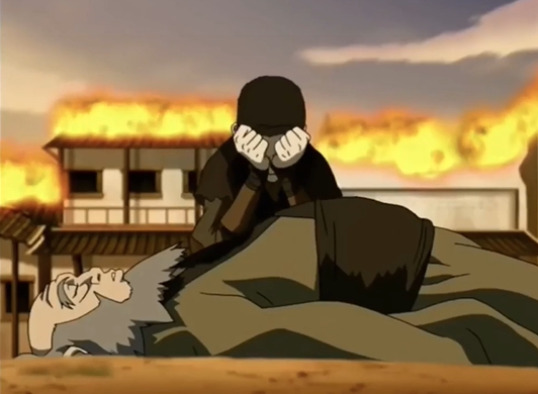
{Image: Iroh laying on his back after getting shot by Azula and Zuko kneeling down next to him with his wrists covering his eyes as he bows his head.}
(The Chase, Book 2)
Because the fact that Iroh is hurt by itself is hard enough, but it’s the context that makes it more heartbreaking.
Up until this point, we’ve seen how much of a positive influence Iroh is on Zuko. He’s been the only one there for Zuko at all times. He’s the one who’s protected Zuko and given him unconditional love. And Zuko’s been angry and difficult, we’ve seen that. And in most series where there’s a clear villain, you’d expect it to be framed like ‘Iroh is way too nice to Zuko, who is a huge asshole.’ But it isn’t. Instead, as we get the context of Zuko’s banishment and as we see how Iroh treats Zuko in season 1, Iroh and Zuko’s relationship becomes clear to us as full of unconditional love, but with barriers that make it difficult for them to communicate that love. Through the series, we see those barriers get knocked down.
In the first episodes, we see Zuko yell at Iroh and generally act like a brat, but it’s also clear that Iroh is the one person that Zuko is comfortable around. Iroh’s the one person who vouches for Zuko and is genuinely rooting for this kid. But it’s clear that he’s not rooting for Zuko to capture the Avatar necessarily, instead, he’s rooting for Zuko to stop hating himself and to stop endangering his own life.
But the thing is, Zuko doesn’t know how to accept it. At all. He’s convinced himself that he doesn’t deserve Iroh’s unconditional love. Zuko was conditioned by his father to believe that in order to be loved, he had to be worthy.
Zuko is consistently surprised whenever Iroh is proud of him or whenever Iroh shows up to protect him. In The Southern Air Temple, when Iroh protects Zuko from Zhao’s illegal hit after the Agni Kai ended and said “disgraceful, even in exile my nephew is more honorable than you”. Zuko’s still surprised that after Zhao did an objectively dishonorable thing after the match, Iroh openly chose Zuko’s side and stood up for him.
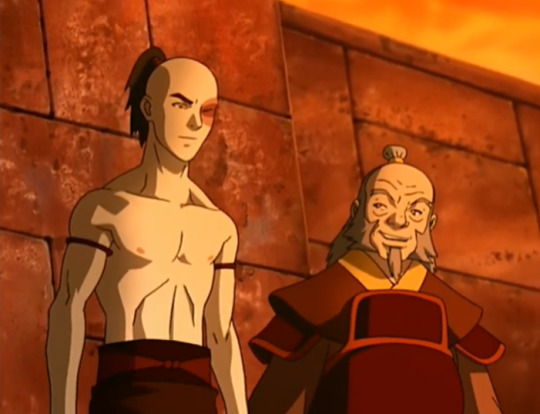
“Did you really mean that Uncle?”
Zuko’s used to people pushing him away. He’s used to having to prove his worth. He’s used to there being a bar for him to have to reach and then when he finally does, the bar just gets moved up higher. Iroh doesn’t have a bar for Zuko. He doesn’t want Zuko to improve himself to meet a standard, rather, he wants Zuko to improve himself in order to be happy and to find self-realization.
There’s the more obvious moment at the end of season 1 with the “ever since I lost my son, I think of you as my own”.

“You don’t have to say it, Uncle”
This scene has already been talked about before, but let’s look at it again. Iroh tells Zuko that he needs to be safe when he goes down to the water and says “ever since I lost my son... I think of you as my own.” This is the first time in the series it’s mentioned that Iroh had a son. That detail itself gives us more insight into Iroh’s motivations. We can look at his actions in the context of ‘he couldn’t protect Lu Ten, so he’s going to do everything in his power to keep Zuko safe’. But it’s also clear that Iroh doesn’t expect or want Zuko to be Lu Ten. It is clear, and it has been clear for the entirety of season one, that Iroh unconditionally loves Zuko. Iroh’s followed Zuko across the world, accepted him for his faults while still wanting him to improve, and is the only person we’ve seen show genuine affection for him.
This scene confirms that unconditional love, but it also reveals that Zuko doesn’t know how to accept it. We already know that Zuko cares about Iroh (mainly from the episode where Zuko forgoes chasing Aang in favor of rescuing Iroh from the earthbenders, which is one of the first truly selfless acts we see Zuko do), but this scene reveals that the reason Zuko pushes away from Iroh isn’t that he doesn’t want his Uncle’s love, but because Zuko thinks he doesn’t deserve it. Zuko says “you don’t have to say it” because he thinks that it’s something that’s harder for Iroh to say rather than something hard for him to hear. Iroh believes it. He loves Zuko and wants him to be safe, but Zuko doesn’t think Iroh has a reason to and can’t wrap his head around it. So he bows as a sign of respect and tells Iroh that they’ll meet again “after [he] finds the Avatar” because Zuko’s convinced that in order to earn love, he has to prove himself. Finding the Avatar is the task he was dealt to earn love, so he focuses on that when met with affection. Iroh hugs him and Zuko just doesn’t understand why. He doesn’t think he’s earned it.
In season 2, the first episode dives a little deeper into this block that Zuko has. When Azula lies to them about Ozai wanting Zuko back, Iroh is able to look at the situation objectively whereas Zuko can only focus on the ‘my father doesn’t think I’m worthless after all’ smoke and mirrors. Iroh sees the situation for what it is: Ozai was needlessly cruel to Zuko and if Zuko returns, that’s what he’s going to be met with. For season 1, Iroh went along with Zuko on his Avatar hunt to make sure he didn’t make stupid, life-threatening decisions and to emotionally support him, but capturing the Avatar was never Iroh’s goal. He didn’t want Zuko to return to the father that scarred him and banished him for not wanting to fight.
So when Zuko is going to take Azula’s offer to return home, Iroh’s protective instincts kick in, but he has to be explicit about it. He has to say the hard truth in order to keep his kid safe.
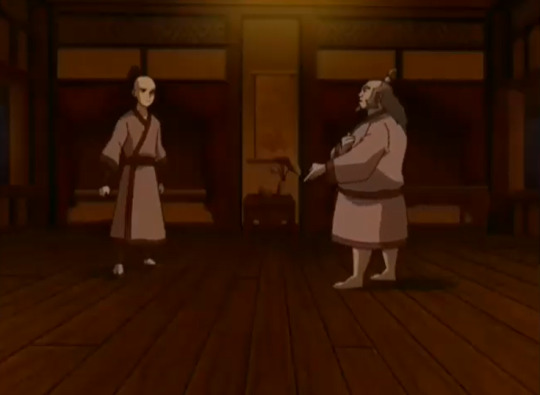
“Father’s realized how important family is to him. He cares about me.”
“I care about you! I mean, if Ozai wants you back, well, I think it might not be for the reasons you imagine.”
Iroh all but explicitly says “Zuko, Ozai mistreated you and doesn’t care about you. If you return, he’s going to hurt you.” But he has to say it, because after three years Zuko still doesn’t want to believe it and is now making a decision that could endanger his life.
And Zuko still rejects this. He lashes out and insults Iroh, accusing him of being jealous of his more successful younger brother. Zuko tells Iroh “you don’t know what my father thinks of me. You don’t know anything.” He’s still holding onto the notion that Ozai’s ‘love’ is something he can win, one way or another. Iroh is the one to recognize the fault in that logic and all he can do it be by Zuko’s side to protect him when shit goes down (which it does).
When the fact that Ozai doesn’t care about Zuko becomes harder to ignore after Zuko finds out that Azula was going to take them as prisoners and his “father considers [him] a miserable failure”, he’s still not ready to accept unconditional love. That fact becomes clear in The Swamp and Avatar Day.

“Do you like your new tea set?”
The scene where Zuko gets mad about begging escalates when Iroh is publically humiliated in order to get them a gold piece. Zuko can’t firebend and the man’s dual swords are taunting him. Those are his weapons and he’s helpless to do anything for Iroh in this situation. Iroh dances as the man swipes knives at his feet and all Zuko can do is watch. What he was raised on was the mentality that he had to prove his parental figures his worth. Zuko was convinced that Iroh providing for him wasn’t how it should be and hates the situation. So he overcompensates: he goes on a crime spree and doesn’t just steal food, he steals gold in order to buy Iroh a fancy tea set.
Iroh tells Zuko that he doesn’t need things to be happy and Zuko gets stuck. He doesn't see a clear way to prove his worth to Iroh anymore and he still doesn’t know how to just accept love without working for it. So he leaves. Zuko decides that “they no longer have anything to gain by traveling together” not because he doesn’t want to be with his Uncle, but because Zuko no longer sees how he is useful to Iroh. Zuko would rather be alone than be a burden, emotionally or otherwise.
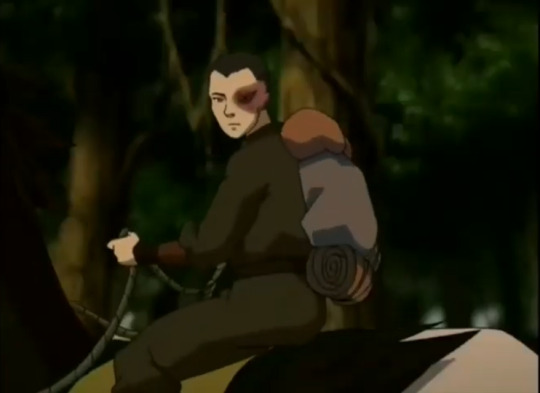
And in The Chase, we find out that Iroh has been following Zuko this whole time. Iroh knows that Zuko needs space to figure himself out, but is always going to be there to keep him physically safe.
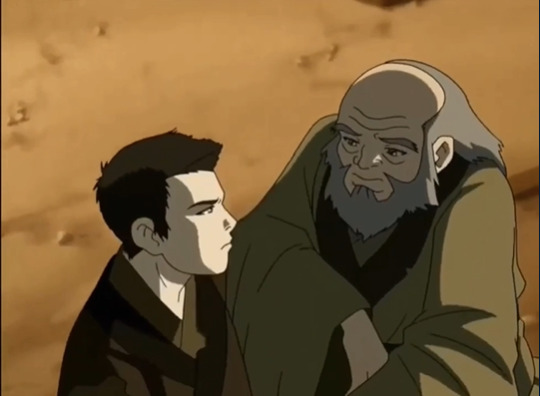
Despite the fact that he left Iroh, despite everything, Iroh was still there. Zuko didn’t really have time to grasp this fact, but Iroh showing up when he got knocked out showed Zuko that yes, this love is unconditional. Iroh’s just going to be there for him and that’s that. Zuko isn’t past the ‘love must be earned’ mentality, but this gesture means so much to him after he felt alone and directionless for weeks.
Then Iroh gets shot by Azula as he’s standing right next to Zuko.
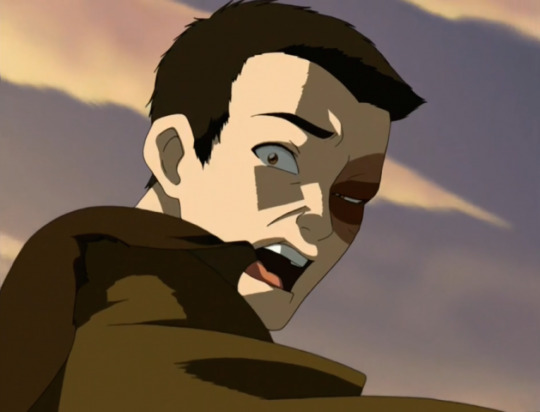
And what’s going through Zuko’s head right now is something along these lines:
He knows his Uncle was there to protect him even when Zuko left
He’s convinced himself that he’s been a burden on his Uncle, just like his dad treated him as
He didn’t have time to thank Iroh for being there anyway
Iroh got hit because he followed Zuko and acted as his protector
Zuko wasn’t able to protect Iroh
So now this person, the one person who was there for him and who always believed in him despite everything is hurt and for all he knows, might not survive, is on the ground and unconscious because Zuko couldn’t protect his Uncle the way his Uncle protected him. And Zuko regrets everything at this moment. He regrets the fact that he left. He regrets not taking Iroh’s advice. He regrets not being a more skilled firebending. He regrets not being able to give back what Iroh gave him in terms of protection.
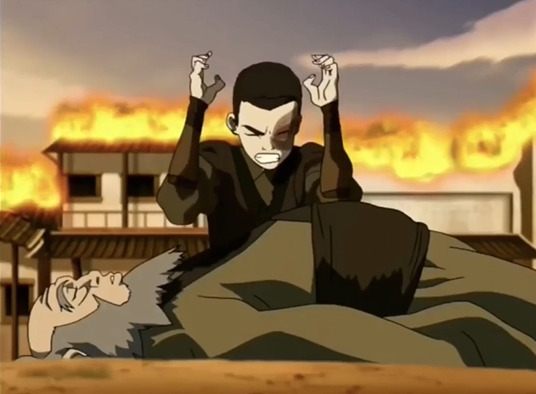
And he’s convinced that he’s failed his Uncle. He looks at this situation and is terrified that Iroh won’t be okay, but he’s also convinced that it was his fault. Zuko thinks that because Iroh decided to side with him from the beginning, his life has been ruined. If Iroh had stayed in the Fire Nation instead of gone with Zuko on his banishment, Iroh wouldn't have spent years at sea, he wouldn’t have been branded a traitor, he wouldn’t be on the run, he wouldn’t have had to beg for coins on the street, and he wouldn’t have been shot in the chest by Azula.
Zuko can’t wrap his head around why Iroh decided to go with him. After all, he’s the banished and disgraceful ex-prince. He’s scarred and untalented and he spends years desperately trying to prove that he’s worth something. Zuko’s been conditioned to think that in order to be worth anyone’s time or affection, he has to prove himself. He has to be useful. And to be the reason Iroh is hurt (which he isn’t but that’s what he thinks is the case), that just means he has to prove himself further.
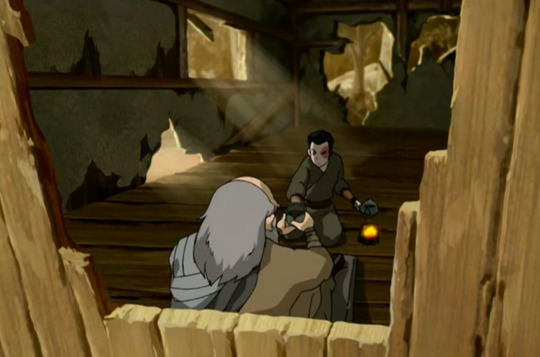
And for the rest of the season, he doesn’t leave Iroh’s side. He knows what it feels like to almost lose his Uncle and can’t risk that again. He takes Iroh’s advice and goes with him to Ba Sing Se. He takes care of Iroh when he’s unconscious, makes him tea, patiently learns lighting redirection (there’s a clear difference in how Zuko listens to Iroh as a teacher from the first episode of season 1 to Bitter Work), guards Iroh from the Rough Rhinos, and tries his best to stay quiet serving tea.
This moment in The Chase is such a pivotal moment for Zuko. For the first half of the series, Iroh has been the parental figure Zuko needed and deserved, but Zuko didn’t understand that. In the moment where he almost loses Iroh, something clicks. Zuko starts to understand what was missing before. He starts to accept that this relationship is something he needs in his life. Zuko realizes that Iroh has been there and he’s going to keep being there and that’s something he isn’t ready to lose. There’s so much shame in the idea that Iroh would be hurt for him and he spends the rest of the season trying to make it up.
And we know that it ends up not being enough to break Zuko away from wanting Ozai’s approval, but this moment reveals just how fractured Zuko’s self-image is, just how much he needs Iroh, and just how much he feels he doesn’t deserve unconditional love. This moment is pure vulnerability as the one person who stuck by Zuko’s side through injury and banishment is hurt.

Zuko is convinced that it’s his fault and if Iroh hadn’t decided to be by his side, this wouldn’t have happened.
#hot leaf meta#zuko#iroh#the chase#the avatar state#bitter work#avatar day#the swamp#the siege of the north#atla#avatar the last airbender#the babes are asking#the southern air temple
2K notes
·
View notes
Text
gods, ok, apparently i’m not done.
atla fandom? we need to have a chat.
(....ok that made me sound pretentious as fuck. and maybe i am, but this needs to be said, cause i’m getting....real, real tired of a Certain Corner of this fandom and as a result, this is gonna be a discourse-heavy post so feel free to scroll past if that’s not your bag. as always, my salt posts all carry the catch-all #salt for ts tag, which you’re free to blacklist/filter at your leisure. i’m Very Annoyed at the moment, which will probably come through in the following post, so just. yknow. be prepared for that. or ignore it, that’s perfectly valid too.)
under a cut bc i do care for my followers and their sanity i swear lmao
there’s a real serious issue in this fandom with not understanding what queer terminology actually means or implies, especially when applied to a fictional narrative.
i’m specifically talking about ‘coding’, here. (if i were in a more meme-y mood, i might have said ‘the atla fandom found out about the term “gay-coding” and haven’t shut up since’.)
to the people who say ‘zuko is gay-coded’, i have this to say: you keep using that word. i do not think it means what you think it means. because he isn’t. i’m sorry, but he’s not! and the fact that this is such a prevalent claim in this fandom is distressing, bc it says to me that none of y’all know what gay-coding is or when and how to apply it! please, i’m begging you, go and look up these terms and what they mean and when they should be used before actually trying to plug them into your critical analysis, because when you misuse them and then call other people delusional for disagreeing with you it casts a pall over the entire fandom and is, i think, the root of some of the worst toxicity this fandom has to offer.
and the thing is, there are cases where gay-coding would apply--for instance, a couple series that are famous for queerbaiting their audience by coding their main characters as being attracted to one another (sometimes even despite their openly stated sexualities) come to mind, but those shows bare no similarities at all to atla and how zuko was written and portrayed! (and it would be funny, if it weren’t so obnoxious and infuriatingly wide-spread throughout the fandom, because the only queer couple we actually seen on-screen in either show wasn’t even queer-coded in any respect, and they’re canonically bi! [yes, i’m shading korrasami, or more accurately i’m shading bryke for refusing to give ka the build-up and development they deserved].)
this absolutely isn’t to say that headcanoning zuko as gay is a bad thing or invalid in any respect. (although the tendency for zukka shippers to do this specifically to keep zuko away from katara and/or invalidate his canon relationship/attraction to girls is more than a little eyebrow raising. especially since sokka is usually allowed to be bi, bc fans have no problem letting sukka stay in the background bc it’s no real threat, while jetko shippers are happy to have both boys be bi. [possibly bc katara is less a threat to jetko bc jetkotara is every bit as valid as any single ship between the three, but zukka can’t exactly let katara join in, and if the potential exists for zuko to be attracted to her then canon giving them the far deeper emotional bond becomes a threat to zukka’s existence? idk for sure--you be the judge.]) i prefer to hc zuko as bi (and always have, long before the atla renaissance), bc i don’t think zuko being attracted to boys is outside the realm of possibility, and it isn’t a threat to my ship since zuko&katara had a deep and emotional bond in canon that is very easy to develop further into something that becomes explicitly romantic--but the headcanon itself isn’t really the problem (although what it’s often in service to can be).
it’s the strange insistence that this is the only way to read his character, bc he was coded that way and so anyone who doesn’t see it must be too straight to understand--and i really shouldn’t have to say why and how that is so incredibly fucking insulting. (the ‘hetero lenses’ comment wasn’t cute when it came from bryke six years ago, and the same sentiment being repackaged and delivered by zukka shippers ain’t cute now.)
calling zuko gay-coded not only demonstrates ignorance as to what the term actually means, and how to usefully apply it in critical analysis, but also validates the frankly bullshit insertion of institutionalized homophobia in the world of atla where it was neither needed, nor wanted, nor ever hinted at in canon. as a queer woman i’m still infuriated by one fucking comic panel shoving institutionalized and systemic homophobia into a world where it was entirely unnecessary (and doing this in the first installment of the franchise showcasing a queer relationship??? making korra and asami worried about ‘coming out’ when they could have just gone on to have cute adventures together and tell people ‘hey we’re dating’ and have everyone else be ‘that’s awesome =DDD’ [because it is, in fact, possible to just have a world without homophobia i promise!!!!!] double yikes, i’m still pissed at bryke about it), and i doubly hate that ‘zuko is gay coded’ has become so widespread that ‘ozai hates him bc he’s gay’ has become a staple in that part of the fandom.
not only does making zuko gay and implying (or outright stating) that ozai hated and abused him because of it completely undermine zuko’s character arc by making his abuse about his sexuality rather than ozai’s toxic pride and anger at seeing himself reflected in his ‘weak’ son, but it comes very close to outright stating that abuse and trauma are inherently gay experiences, and they aren’t!!! they really aren’t, i promise!!!
abuse and trauma narratives exist outside of ‘my dad hates me because i’m gay’. and, quite frankly, there are MORE THAN ENOUGH queer trauma narratives out in the world. we do not need to start trying to retroactively make them canon in a series where they didn’t exist! if you’re gay and see yourself in zuko and project your own experiences on him, that’s understandable and valid. that does not make zuko gay-coded. and honestly, the insistence that he is makes very little sense to me, because you’re essentially trying to give the show credit for work you put into interpreting the characters! why would you want to do that? why not own your own headcanons and take credit for them, rather than insisting they are canon and everyone else is wrong for not seeing them??? like, i’ve said before that i’ve always headcanoned zuko (and katara) as bi, and even support it with my interpretations of evidence from the show, but the difference between ‘i think zuko is bi’ and ‘zuko is definitely gay-coded’ is that i know that bi zuko is my interpretation of canon, and that it is work i’m putting into the show that wasn’t actually intended by the creators/writers, no matter how much sexual tension i read into the jetko swordfight.
and like, zuko’s character arc doesn’t actually parallel a queer one all that well to begin with. it’s easy enough to do the work and twist it sideways just enough to make the general points fit, but the fact is, zuko’s arc is not one of self-discovery. it’s not one of coming to understand something fundamental about himself that he can’t change, that he was hated for, and coming out to his father in a dramatic confrontation where he shows that he understands himself and doesn’t need his father’s acceptance to be fulfilled.
zuko’s arc is actually one of trauma and healing. and those can (and often are--like i said, there are more than enough queer trauma narratives in the world, atla really doesn’t need to be one of them) be part of queer narratives, for sure! but they aren’t uniquely queer. and zuko’s confrontation with ozai during the eclipse doesn’t read like a ‘coming out’ at all. (yes, i’ve seen that post. yes, i rolled my eyes and moved on, bc unlike some people, i’m capable of not clowning on correctly tagged posts i disagree with.) zuko is specifically confronting ozai over his abuse, because his arc wasn’t about discovering anything fundamental about himself (and therefore realizing that ozai was hating him for something he couldn’t change)--it was about realizing that he was not at fault for the way his father treated him. it was also about realizing that the fire nation was broken and corrupt at its core, and that his father was an aspect of that he needed to break away from so that he could help the world begin to heal.
he says it himself:
Zuko: No, I've learned everything! And I've had to learn it on my own! Growing up, we were taught that the Fire Nation was the greatest civilization in history. And somehow, the War was our way of sharing our greatness with the rest of the world. What an amazing lie that was. The people of the world are terrified by the Fire Nation. They don't see our greatness. They hate us! And we deserve it! We've created an era of fear in the world. And if we don't want the world to destroy itself, we need to replace it with an era of peace and kindness.
making this about zuko being gay and rejecting ozai’s homophobia, rather than zuko learning fundamental truths about the world and about his home and about how there was something deeply wrong with his nation that needed to be fixed in order for the world to heal (and, no, ‘homophobia’ is not the answer to ‘what is wrong with the fire nation’, i’m still fucking pissed at bryke about that), misses the entire point of his character arc. this is the culmination of zuko realizing that he should never have had to earn his father’s love, because that should have been unconditional from the start. this is zuko realizing that he was not at fault for his father’s abuse--that speaking out of turn in a war meeting in no way justified fighting a duel with a child.
is that first realization (that a parent’s love should be unconditional, and if it isn’t, then that is the parent’s fault and not the child’s) something that queer kids in homophobic households/families can relate to? of course it is. but it’s also something that every other abused kid, straight kids and even queer kids who were abused for other reasons before they even knew they were anything other than cishet, can relate to as well. in that respect, it is not a uniquely queer experience, nor is it a uniquely queer story, and zuko not being attracted to girls (which is what a lot of it seems to boil down to, at the end of the day--cutting down zuko’s potential ships so that only zukka and a few far more niche ships are left standing) is not necessary to his character arc. nor does it particularly make sense.
(and before anyone brings up his date with jin--a) he enjoyed it when she kissed him, and b) he was a traumatized, abused child going out on a first date. of course he was fucking awkward. have you ever met a teenage boy????)
anyway, uh, that was a lot of words, so have a tl;dr: zuko is not gay-coded. there is nothing uniquely gay (or even uniquely queer) about his character arc or characterization, and he was certainly not coded gay in an attempt to sneak a queer character past the censors. if anyone involved with atla was gonna try that, it would’ve been in lok, and as established, they didn’t even manage to queer-code the actual queer relationship before the last few minutes of the final episode. headcanoning zuko as gay is absolutely fine (though if it’s only done to keep him away from female characters he may otherwise be attracted to, that smells more like misogyny than anything else), but insisting that this reading is the only one that makes sense, and anyone who doesn’t agree must be straight (hello, queer woman here making this insanely long thinkpiece) is very much not.
ship what you like, but stop trying to invalidate other ships and other interpretations of characters just to make your ship seem more plausible. it’s really not a good look.
#atla#zuko#zukka salt#more like zukka shipper salt#atla fandom salt#salt for ts#zuko is not gay coded and im so so tired of seeing that argument in this fandom#it's fine as a hc but it's not canon and was never remotely intended and his arc isn't particularly evocative of a gay narrative#long post#queer things
289 notes
·
View notes
Text
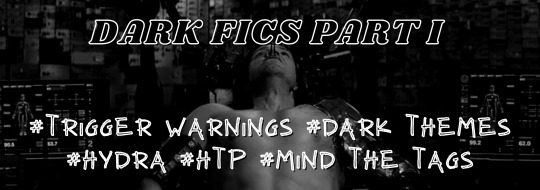
These are all dark fics, READ THE TAGS before reading the fics. It is your responsibility to check whether what you are about to read is something that you can stomach. While most of these fics are based around trauma, recovery etc many feature triggering scenes or flashbacks as well as darker themes. Please be safe and don’t read them if they can be triggering for you! Proceed with caution! Most of them are Hydra Trash, but still not just the ugly bits as I like there to be a plot. Hiding them below the cut:
between scylla and charybdis | 21590 words
Sam Wilson has been witness to a lot of things he wishes he could unsee. Civilian families shot dead in their cars because of miscommunications at checkpoints. Riley’s body spiralling to the ground in a smoke-plumed plummet. His own face in his bathroom mirror after waking up hung-over as hell at two in the afternoon, the day after the anniversary of Riley’s death, year after year after year.
And now, in an abandoned bunker on the outskirts of Boston, a seemingly unremarkable manila folder at the bottom of a filing cabinet.
Berceuse | 10730 words
There are strange, new things Bucky needs from Steve.
Dreamers Often Lie | 11040 words
As far as Bucky remembers, sex is something that is painful and terrifying if you wake up while it's happening. As the Asset, sleeping through sex was a rare treat. When Steve lets Bucky know he's interested in a sexual relationship, what Steve doesn't know is that they have fundamentally different ideas of what that entails.
despite the threatening sky and the shuddering earth (they remained) | 71532 words
“They really didn’t want the mask to come off.” Hill thumbed through the scans, and pulled out a film that she then handed over to Sam, face mostly expressionless but for the flat line of her pursed lips.
Sam accepted the film and held it up to the light, angling so both he and Steve could see it, squinting at the outline of the Winter Soldier’s skull, and the blips of unnatural white that showed up, God, in his brain, not to mention about half his teeth, plus the mask, with its thin protrusions—
“Those are pins,” Steve realized. He looked over at Hill. “The mask—it’s nailed to his face.”
Hill’s face was as unmoved as ever. “Like I said. They really didn’t want it coming off.”
Fire And Water For Your Love | 77084 words
When the Avengers investigate an abandoned HYDRA base on behalf of S.H.I.E.L.D., they unexpectedly encounter a dark-haired man with a torn metal arm, who leads them to an even more shocking discovery deeper inside the base. The Avengers must reconcile what they have found with the lies S.H.I.E.L.D. has been telling for decades.
Give An Inch | 5070 words
The Captain has a warm smile and clear, open eyes. The Soldier knows these are tricks. He's fallen for them before and he won't do it again.
Humans As Gods | 4818 words
"HYDRA's scientists had been delighted to find their serum-reversal procedure had worked. Their jubilation was dampened by the discovery that Steve's smaller self might no longer be Captain America-sized but was still 100% Steve Rogers, and Steve Rogers was now mad enough to spit nails. A minor oversight in the design of the containment area meant that smaller-Steve had simply wriggled out of the now ridiculously-oversized restraints like an angry ferret escaping a paper bag, and punched the nearest technician in the nuts.
Chaos ensued."
HYDRA scientists successfully de-serum Captain America, only to discover that they are utterly unprepared for Steve Rogers. Meanwhile, the Winter Soldier follows his instructions to the letter. This works out just great.
The Only One That Needs To Know | 6571 words
Bucky can't control his body. He can only control what secrets he keeps.
I Was Wearing My Blue Coat | 11503 words
Following exposure of his past as the Winter Soldier, anonymous postings of explicit video footage, 63 charges of murder and the wrath of the Internet, James Buchanan "Bucky" Barnes finally steps into the limelight and tells his story to Zenat Patel of the New York Times.
Compliance Will Be Rewarded | 4767 words
Someone told him once: "Compliance will be rewarded," and he remembers pressing his head against a man’s leg in open supplication. He remembers hands in his hair, and a gentle grip on the back of his neck. He remembers a man telling him "so good, so good for me aren't you?" And he remembers nodding his head in a desperate attempt to be exactly as good as he was supposed to be.
~*~*~*~*~*~*~*~*~*~*
Bucky Barnes is physically free from Hydra, but the hold on his mind lingers still. All he wants is to go home, and he'll do anything he can to get there.
To Burn Your Kingdom Down | 12370 words
The Avengers go after a Hydra splinter cell with a nasty habit of brutalizing their prisoners. Steve has some ugly history with them, and when a rescue mission gone wrong leaves him and Sam in enemy hands, the situation gets uglier still.
Worth The Wound | 7709 words
The asset knows that maintenance is better than punishment. But with Steve, maintenance becomes more pleasant, soft and gentle and everything he could dream of. It was only natural that he decided to prolong that maintenance a little longer.
The Spaces In-Between | 6971 words | Part 1 of What We Tried So Hard To Hide Away
"Memories are like buckets of water: they weigh on the heart and the brain until the body fails. You're blessed to stay forgetful and young, Soldier."
Sometimes blessings feel like curses.
Illuminate The Scene | 7086 words | Part 2 of What We Tried So Hard To Hide Away
The doctors had wanted to keep the Soldier. Shock him and freeze him until he was fixed, or tear him to scrap if he couldn’t be repaired so that he wouldn’t be an entirely wasted investment. Steve is the only thing stopping them.
When the Soldier can't trust his own body, how can he trust anything?
All These Riots Of Broken Sound | 83790 words | Part 1 of Forever Is A Close And Honest Friend
When Steve and the team return to Avengers tower to find Bucky gone, they must venture into B.A.R.F. to figure out what triggered him to leave and hunt those who wronged him. Trapped in a simulation of Bucky's worst memories with rogue HYDRA agents waiting to strike, 100 years of secrets, lies, pain and love drive the team to their limit and push Steve towards a realisation that is a century in the making.
I Was Lost But Left A Trace | 3585 words | Part 2 of Forever Is A Close And Honest Friend
Disorientated, the Asset reached up to wipe at the moisture on its cheeks and was shocked to find it clear, instead of the crimson it has been expecting. It didn’t understand why this misidentification had caused uproarious laughter from the technicians.
“It is not blood,” the Asset told him, “but it is still a malfunction.”
This sobered the technician a little, and he nodded tightly.
“Yes. It is. But we will fix you.”
I’ll Always Be Blamed For The Sun Going Down | 9907 words | Part 3 of Forever Is A Close And Honest Friend
He knows he’s in the right place. He has heard the guys at the docks laugh and joke about the queers who come out after dark, looking to earn a little extra cash. He has seen the johns, when he’s been out late enough, skulking in the shadows like predators hunting for their next meal, looking for something in particular. Sometimes they look at him.
A small, rusty pen knife that his father had picked up in Europe during the Great War sits heavy in the breast pocket of his jacket.
Just in case.
Book Of The Moon | 16019 words | Part 4 of Forever Is A Close And Honest Friend
In 1929, Bucky Barnes falls in love for the first time and resigns himself to never telling a soul, let alone Steve, the object of his affections. In 1943, half a world away from the man he can never have and fighting for his life and his sanity, something new begins to bloom.
Habeas Corpus | 18054 words
An unexpected incident in the field leaves Steve Rogers facing the infiltration of a Hydra base and retrieval of important intelligence, all while pretending to be the Winter Soldier. Unfortunately, there are important aspects of the Soldier's past that Bucky hasn't disclosed, and Steve has no idea what he's really walking into.
Bullies | 14979 words
Written for the MCU trash meme prompt:
I wanna see Steve being messed with by his secretly-HYDRA coworker buddies. I want them generally fucking with him, "accidentally" doing terrible things to him or getting Steve into awful situations, telling jokes that aren't really jokes, gaslighting, performing sexual-assault hazing under the guise that "that's what people do now," pressuring him into other sex shit, anything, just fuck Steve up.
Steve isn't failing to fully catch on because he's dumb or oblivious: it's just that he is Steve, so he wants to believe the best of everybody, and he doesn't want to believe that he could be working for/with bullies and that (as Natasha says) he essentially died for nothing.
Not Unwanted, Not Unloved | 50320 words
They'd resigned themselves to never becoming parents - until Bucky gets pregnant and drops off the grid without even a whisper to his mate about his condition.
Steve will still raze the earth to find him, but that doesn't mean he likes what he finds.
The Tones That Tremble Down Your Spine | 13889 words
Tony tells him they’re planning a party for Steve’s birthday. He knows how parties are supposed to go.
Lacuna | 62875 words
The Winter Soldier doesn't remember Steve Rogers, but he needs Rogers' help.
OR: The one where Bucky doesn't remember Steve, but falls in love with him anyway.
Not A Perfect Soldier | 93354 words
In a world where HYDRA was wiped out in the '40s, Steve is found by the Army rather than SHIELD. General Thaddeus Ross wants a perfectly obedient super-soldier at his command, and to that end, he sets out to break Steve to his will. As Steve struggles to come to terms with all he has lost, his life in captivity is only made bearable by the presence of another prisoner-- another super-soldier known only as "Soldat".
Then the Avengers strike a deal with Ross to "borrow" him for missions, and Steve is faced with a team who dislikes him, an organization he doesn't trust, and the question of what he's willing to do to escape Ross's clutches.
For Want Of Him | 103174 words
It's the twenty-first century, and Steve Rogers has never been more alone. Everything he knew, everyone he loved, is now gone, and a dark, bitter loneliness claws at him, raking bleeding gashes into his heart.
And then there's Brock Rumlow.
Rumlow is like salt in his wounds; vicious, and cruel. But his dark brown hair and teasing smirk reminds Steve of someone long dead, and his New York accent sounds like home...He's a soldier like him...he understands. And Steve makes the fatal mistake of trusting him.
The Same Measure | 4943 words
The Winter Soldier was never allowed to stop unless an injury was too grievous.
To Be Unmade | 5114 words | Part 1 of Alexander Pierce Should Have Died Slower
For the asset, things only ever get worse. The external scars fade quickly enough. The internal ones dig deeper and deeper.
But the internal scars are called love, and doesn't that make them worth the hurt?
Do Not Put In The Icebox | 7143 words | Part 2 of Alexander Pierce Should Have Died Slower
When the asset malfunctions on a mission, Rumlow and Rollins learn more than they ever wanted to know about Pierce's hobbies.
And then everyone has pancakes.
The Knowing Makes It Worse | 4130 words | Part 3 of Alexander Pierce Should Have Died Slower
No is a bad word and invites punishment.
Or, Alexander Pierce is a very bad man who delights in manipulating and degrading the asset.
Love Is For Children | 5303 words | Part 4 of Alexander Pierce Should Have Died Slower
Bucky understands how the game works. He can't understand why it makes Steve cry.
But Natasha and the other Avengers are there to help.
I Just Wanted To Be Sure Of You | 4461 words | Part 5 of Alexander Pierce Should Have Died Slower
Bucky has Bucky Bear; it's only fair for Natasha to have something of her own.
Visiting a toy store wasn't strictly necessary, but if Tony wants to throw money around, no one's going to complain.
“Till The End Of The Line | 6069 words | Part 6 of Alexander Pierce Should Have Died Slower
It's hard to take a friendship right back up when so much has changed over seventy years.
Particularly when HYDRA's conditioning resurfaces.
*if you feel that any of these fics shouldn’t be in this list please just send me a message! :) I have read them all but over the past 1+ years so some of them I might not remember all the details of :)
#HTP#hydra trash party#dark fics#recovery fics#but with A LOT of trigger warnings#puppy peter fic recs#don't like don't read#hydra angst#bucky angst#bucky whump#MIND THE TAGS!!!
117 notes
·
View notes
Text
Proving all the Knights of the Round Table have magic part 3: Elyan
I've seen quite a few people headcanon Elyan with magic before, and it's definitely one of the more popular magic!knights hcs, so I apologise if I accidentally hijack anyone else's points xx
The most obvious indicator of this is the fact that Elyan leaves Camelot a year before Merlin arrives. This is about the same age Morgana's magic shows itself, so it would be natural to assume he left because he began showing signs of being a warlock, Camelot's laws being what they are.
It is also implied that Elyan left fairly abruptly, with Gwen having no idea where he went. He may have left in a hurry because somebody might have noticed him, and not told Gwen or Tom for fear of putting them in danger.
Perhaps in a darker note, he didn't say where he was going because he was ashamed of his magic and didn't think his family would accept him.
Gwen says that "[Elyan] always seems to be in the wrong place at the wrong time". Maybe accidents happen around him because he had trouble controlling his magic and found it increasingly difficult to cover for. This could be another indicator as to why he left.
Elyan didn't return to Camelot even for his father's funeral, and while he expresses his guilt, he doesn't give sufficient reason why: the reason? He may not be able to tell Gwen because he was still scared to return with magic.
When Gwen reveals her relationship with Arthur, Elyan is skeptical, and maybe even a little panicked. After all, would your sister falling in love with someone with the power to set you ablaze not be a terrifying concept to anyone with magic? But when Arthur comes to rescue them and proves himself to be slightly less of a prat than he may think, he tentatively agrees to return home, though I suspect this is mainly for Gwen's sake.
When the immortal army invades Camelot, Elyan manages to stay hidden and fight off some soldiers. Note that he is the only one of the group within Camelot with no Knights' training, which begs the question: how did he manage to escape? The answer could very well lie with magic.
Again, in The Darkest Hour, he is one of two knights that survived the meeting with Morgana. He is one of the more inexperienced knights as well, which suggests that he may have aided himself magically in the fight.
When faced with a seemingly unbeatable threat, Elyan says to Arthur: "tomorrow, we fight in your name, sure. For freedom and justice in this land." Now there is a lot to unpack here, but if we break it down, firstly there is the fact that Elyan places is emphasis on "your" when addressing Arthur. He has previously made a statement about the Pendragon crest, but in this moment, it seems that he cares more about Arthur than this. This is clearly indicative of the fierce bond between Arthur and the core knights, but it could be more than that: the emphasis of "your" is specific to Arthur, but perhaps more importantly, it is an exclusion of Uther. In his time, Arthur has made mistakes, but he has generally been more sympathetic towards magic than his father, and this may be Elyan's subtle way of acknowledging that.
In addition, the words: "for freedom and justice in this land" could just be in reference for Arthur's abilities as king, but this is a deep speech and one would assume it has a deeper meaning. Freedom and justice are two things that have not been afforded to those with magic for a long time. Uther's twisted "justice" involved executing anyone who disagreed with him and anyone who could be vaguely affiliated with sorcery. As for freedom, Arthur has created a fairer kingdom than his father, but magic users still live in fear. Combined with the earlier stress of "your", this is indicative that Elyan too believes that Arthur may one day come to bring peace to anyone who is born with magic.
This last point also has the implications that Elyan knows of the Once and Future King and surrounding prophecies. Though he is described as a troublemaker by Gwen before he comes to Camelot, he keeps his head relatively low upon arrival. Perhaps in the time he spent travelling, he sought help from magical communities, e.g. the druids, who helped him control his powers. This would also explain his vagueness about his whereabouts and lack of contact during the years he was missing.
I could go on about this quote but we'll leave it there for now.
Before he is overtaken by the power of the Lamia, Elyan is vocal in standing up for Merlin. This could be because he knows what it is like to be shunned by society. Magic could be a reason for that. (Also I fully believe that the only reason the Lamia didn't try and take over Merlin was because she was scared of the extent of his magic, not just because he had magic.)(and the merthur reasons when I'm in the mood)
Then Elyan falls sick, before the others begin to show symptoms. Maybe the Lamia sensed some magic and decided he was more trouble than he was worth.
Elyan was not raised by druids, and does not have the same powers as Merlin so wouldn't have sensed the power of the shrine, at least not too strongly. When he first sees the spirit though, he is genuinely sympathetic, even before the murderous intent takes hold.
In the Dark Tower, Elyan is consumed by his need to find Gwen, convinced that he is to blame for her capture. This could be survivor's guilt (and to an extent, probably is), but it is equally probable that Elyan believes that he should have used his magic to protect her.
Going off on a slight tangent here, the theme of "I have magic so it must have a purpose" within warlocks/sorcerers in the show is a) not a healthy mindset and b) uncomfortably common. Elyan may have latched onto the idea that he must use his magic to protect Gwen to convince himself to stay in Camelot, and with that conprmino, he began to fall apart. His behaviour is almost identical to Merlin's fervour regarding Arthur at this point, and it's fairly disturbing that these characters adopt this mindset that is Not Good For Their Mental Heath, Please Get Some Therapy.
Elyan dies. It's heartbreaking, and he does so trying to save his sister. But what is interesting is his funeral. When most main characters die, they are given a funeral in Camelot, e.g. Uther, Lancelot (the first time). But then Freya and Shade!Lanceot (and later Arthur) are set to rest in the Lake of Avalon. The difference between the two is that the lake funerals were arranged by Merlin, and those laid to rest there can somehow be affiliated with magic.
Now I'm not saying that Merlin knew about Elyan's magic, because sometimes he can be really not very perceptive about that (though it's always fun when fics cheerily toss that out the window because it's fun goddamnit-), but I don't believe he was entirely oblivious. Think about it: there are two of Arthur's closest friends canonically hiding magic from him and it's fairly probable that they'll pick up on Elyan's magic at some point. Even if it's just little things like his sympathies with magic or gentle arguments about the way mages are treated. There are so many avenues to explore with this it's overwhelming-
I also think Elyan may have picked up on Merlin's magic later in the series: the point of realisation was probably when Merlin rescued him during his time being possessed by the drowned druid boy, upon which he says: "you know, Merlin, you're much braver than you look." This is the first time Merlin has revealed his more BAMF side to Elyan, and in this moment, something unspoken passes between them. If not mutual understanding, it is at least Elyan realising what Merlin does beneath his carefree exterior, and despite the possession, I think he acquires a lot of new respect for his friend.
(also are we going to ignore that the lake funeral implies that it was arranged by Merlin. How close were they and what stuff did we miss out on behind the scenes for him to be trusted with this?? I need to know)
Elyan and Mordred have a friendship in series 5. If the earlier headcanon about Elyan learning to control his magic with druids is true, perhaps he may have recognised Mordred from his time there. They probably didn't acknowledge it much, but it created a bond between them.
And now for the mythological context!!
Of all the Knights of the Round Table, Elyan's backstory is perhaps the most estranged from the original legend (of course all of them are fairly disconnected *flashbacks to pope-gwaine* but Elyan's is w a c k y)
As a consequence, there is little to draw on for behind-the-scenes evidence of magic.
Elyan, or Helayn, was another Knight whose origins stem from France (the Vulgate Cycle, I think, though he could have surfaced earlier). He is said to have joined Lancelot in exile after his affair of 'courtly love' with Guinevere (go and look up this concept- it gets convoluted in the myths but is really interesting in terms of both origin and content). Anyway, his exile here could represent the time he spent out of Camelot before his appearance in s3, and relates to hiding from harsh laws, particularly if we regard Lancelot and Guinevere's relationship in the same way as we do in the Vulgate Cycle (basically keep the context with the appropriate work and it sort of makes sense)
I appreciate this seems a little like grasping at straws but that's literature I suppose ¯\_(ツ)_/¯
In the legends, Elyan is nephew to another of Arthur's knights, Sir Sagramore. This knight is less famous than some, but at one point, he embarks on a quest to find the fay. The fay are closely linked with the she, and perhaps also live on Avalon, somewhere mortals are only supposed to see moments before death. Perhaps Elyan can be associated with this magic?
In reality, there is little written of Elyan and no prose or poetry dedicated to him so it's quite hard to find stuff about him.
Also legend!Elyan is heir to the throne of Constantinople, which just goes to prove how widespread and deeply convoluted the mythos is.
#pope-adopted-gwaine and emperor-of-constantinople-elyan team up in an epic crack-y au lmao#honestly the idea of elyan having magic is so plausible but also so sad#he isolated himself and then lost the person he cared about and that's heartbreaking#won't stop the headcanoning though ✌️#bbc merlin#bbc elyan#sir elyan
38 notes
·
View notes
Text
Enjoy This As Much As I Do
I rise to offer you some of @coconut-cluster‘s uni au! It’s such cute loceit and I couldn’t resist writing a quick little drabble. We’ve seen a lot of pining Janus so I decided to let Logan be a bit gay, as a treat. This is just an entire monologue and it may be out-of-character but I hope you like it, Lexi!
(Title is from their wonderful drabble!)
Word count: 1400
Warnings: a bit of anxiety, but nothing much
If asked, Logan would say he knew nothing about Janus Peters. They didn’t spend much time together, after all. They were enemies--or rivals might be the less dramatic term, although something about Peters made him feel very dramatic in his hatred. They tolerated each other around their friends, in a very forced sort of way, and managed to wrangle a simmering truce whenever Logan’s schoolwork was in too much jeopardy.
If pressed, Logan would admit he knew some things about Janus Peters. They’d been rivals for a long time, after all, and their mutual friends dragged them together enough that they had to pick up some things. Peters knew that Logan did archery, and promptly teased him about it. Logan knew that Peters sang, although it had taken him a long time to learn, and the knowledge itself had been--a sudden event.
Of course they knew things like that. It was only understandable, from all the times they’d debated long into the evening, the conversation fiery and managing to burn away the time until it was just Logan and Janus and a world of possibilities. Peters could argue for any position. Logan was starting to think he chose the opinion opposite of Logan’s on purpose, just so they could argue longer, and Logan wished he was more annoyed by that.
If asked, Logan would say he didn’t care much for Janus Peters.
If pressed, he’d go silent.
Logan knew things about Janus Peters, and Peters knew things about him, in the peculiar way of two people not sure what to do with those things. Logan simply soaked up facts and words, slipped in loaded glances, and compiled the data. For what, he wasn’t sure. For using against Peters? No, that was more a move Peters would do.
Except Peters knew things about Logan, too. Logan knew in a vague way, undefined, and he couldn’t pinpoint what things, but he was sure they existed in Peters’ mind. Maybe Peters was saving them up for something, too. Maybe Peters knew why they did it, why they watched each other when things grew silent, why during each debate, they learned more about each other than the subject.
Of course, he was sure Peters didn’t care.
Logan didn’t care, either. He never thought about Peters the moment they left the library. He didn’t think about Peters always getting cold and how he took Logan’s jacket without a word. He didn’t think about Peters’ outfits and the way he sat in his chair like he owned the library. He didn’t think about Peters’ tendency to grab his wrist when walking, or his light shoulder-touch when they needed to talk, or the times he tugged Logan by the tie until they were close enough that Logan could make out the flecks of sunlight in his eyes.
Peters always looked the best in the sun, glowing at the edges and eyes flaming, golden and smirking and looking at Logan like Logan was the most interesting thing in the world.
Which was irrelevant, and always had been irrelevant, and Logan didn’t think about that at all.
They knew things about each other, and Logan had never figured out quite why he let Peters see so much.
Logan tugged on his curls when frustrated, Logan blurted out random thoughts when they came to mind, Logan had a specific coffee order and Peters knew it all. Peters teased him, Peters was silent, and Peters knew all that, and Peters knew more.
They knew things about each other, and Logan had always enjoyed the pursuit of knowledge, but he couldn’t say he wasn’t scared.
They had made a sort of peace, a small truce, regarding certain things. They balanced an inch from each other in one corner of the library, and if Peters didn’t push Logan away, Logan didn’t give in and pull him closer. They danced around the point in debates so nobody won too much and everyone had a chance to speak. They didn’t mention the small things, the small moments that stayed warm and soft in Logan’s chest long after Peters left, the tinge of something that trembled between them when they were silent.
Even Logan wasn’t naive enough to say there was nothing there. They could pretend all they liked, but something was shifting, and they were making a silent agreement to let it be.
If asked, Logan would say he hated Janus Peters.
If pressed, what would he say?
What did he want to say?
Logan had no answers, and that terrified him.
This all terrified him, if he thought about it too hard, because something nebulous was surrounding them, beautiful as sunlight and thick as smoke. Logan didn’t know what it was. He was intelligent and knew it, and he probably could put the pieces together, but he didn’t want to see the finished puzzle. It would change things. And he liked things in limbo, frozen sunlight and stiff pages, silence with touching shoulders and debates that ended up inches from each other, never colliding.
Binary stars, Logan had learned one day, were two stars that danced around the same barycenter, circling each other so close that they appeared as one from a distance. Sometimes they stayed like that for centuries and centuries and centuries, in a delicate balance.
Sometimes they collided, and two stars colliding was one of the most beautiful and terrible things in the universe.
The stars didn’t usually survive.
Was it worth it, the moment before catastrophe, finally closing the distance?
What if Logan asked Janus these questions, the ones he barely let himself ask? Would Janus laugh? Would Janus take them seriously? Would it destroy everything to look beneath the surface, send them askew like a train off the tracks, smoke trailing as they careened out of alignment?
They had a peace--a funny thing to call it, with their endless rivalry, but a sort of balance. A mutual agreement. Some things were simply not to be mentioned.
If asked, Logan didn’t know how he felt about Janus Peters.
But nobody asked, so Logan didn’t need to tell.
Logan just needed to keep his distance, tug Peters in and push him away, and let himself drift in the shallows instead of going deeper. He didn’t know what was happening, what Peters was thinking, why what they were was suddenly, possibly, impossibly, in question. He didn’t know.
Logan didn’t know, and for once, he didn’t want to.
No questions today. No answers. Nothing but debates and sunlight and coffee orders memorized and late nights in the library and Janus’ voice onstage, his winking eyes and smug smile, the way he leaned his elbow into Logan’s when they worked, the way he flushed when Logan pulled him close.
They didn’t need anything more than that. Not yet.
Maybe things would change, but not yet.
For now, they would keep their distance, and the world would keep turning, and Logan would let some things be.
Logan didn’t care about Janus, and Janus didn’t care about Logan, and that was their conclusion. They could twist the evidence to fit that, too. Janus was a good debater. He could argue for any side. This was the one he’d chosen, and Logan would fall in line.
They would argue, and they would talk, and they would let silence stretch on, and they would drift around each other in perfectly paved paths.
One day they would collide, perhaps, and Logan woudl have to deal with the fallout.
One day was not today.
Today, now, there was sunlight and arguments to be made and arguments to tear down. Today, now, there was Janus Peters, and so far they’d found a middle ground.
Today, now, the world was wide open.
If asked, Logan would say he didn’t care if this ended.
But perhaps for curiosity’s sake, perhaps for revenge, perhaps for vitriol--perhaps for any number of things, Logan didn’t care to name them--if pressed, Logan would say he was going to let it go on, just a little bit longer.
And if Janus asked, Logan didn’t know what he’d say. Maybe nothing. Silence had gotten them this far.
Or maybe he’d pick a fight. Or maybe he’d push Janus away, or pull him close. Logan didn’t know.
When it came to Janus--confusing, confounding, bewitching Janus Peters--Logan didn’t know a thing.
And wasn’t that the most exciting thing in the universe?
General taglist:
@the17thmeatball
@most-likely-fandom
@csi-baker-street-babes
@caffeinated-cryptid
@thefivecalls
@ollyollyoxinfree
@the-gay-is-back
@dramaticsnakes
@stoicpanther
@chaospersonified
@thatoneloudowl
@jungle321jungle
@mistythegirlfluxmess
#loceit#logan sanders#janus sanders#sanders sides#averywrites#this is kinda a mess but i like it!!#just banged it out this evening#again lexi your au is incredible and i love it!
277 notes
·
View notes
Text
Gale: Manipulation, Lies, and Trust
Disclaimer Game Version: All these analyses were written up to the game version v4.1.104.3536 (Early access). As long as new content is added, and as long as I have free time for that, I will try to keep updating this information. Written in June 2021.
Additional disclaimers about meta-knowledge and interpretations in this (post) while disclaimers about Context in this (one).
Before anything I strongly suggest reading this post about "Context, persuasion, and manipulation" to understand in a simplified way the meaning of the words we use, so despite not being related to bg3, it's related to communication and social issues. Since fandom loves to misuse them, I think it requires a proper explanation so we all know in which frame we are analysing these scenes.
Due to the fact that this post ended up turning into a much longer one than I wanted to, I split it into four posts, each of them showing how many sides Gale has in those scenes, how much his actions are "manipulative", how many details related to lore he shares, and possible interpretations of his behaviour, since it's rather easy to lose his scenes because they have the lowest priority. In this post I will only make a summary and a compilation of the broad details explained in those posts, so pick what you want to read since all these posts may have overlap of information and repetitive concepts (they were written to be self-contained as much as possible).
'Stew'Scene
"Loss Scene"
"Party Scene" (with Revelation scene)
"Extra Scenes": Death Protocol and Comments on Dreams
I'm analysing these scenes in detail because I noticed that many players incorrectly paraphrase Gale's words, putting in his mouth words he never said, so for the sake of transparency, I transcribed many fragments of his dialogues, making these posts more lengthy than they should be.
The stew scene
The details are shown in the post of the "'Stew'Scene". In this scene, Gale shares a friendly introduction with the stew and with a list of good deeds done by Tav. This shows that he has begun to trust Tav so he can talk about this issue earlier than he wanted to (he will wait much longer in the neutral version). As a gesture of honesty, Gale sets an explicit boundary by telling Tav to refrain their curiosity and do not ask about the 'why' of the issue he is about to talk about (under no circumstance he is forcing Tav to agree with the delivery of artefacts before telling them 'what' he needs). He acknowledges that it may be unfair not to give the whole context, but he still can't speak in detail about this very personal issue. As an interesting detail, his trust in Tav at this moment of the conversation is so honest that he has not shielded his mind, so Tav can intrude with the tadpole without Gale knowing it—if Tav succeeds— . If Gale doesn't trust Tav even successful intrusions of the tadpole can be perceived by Gale's trained and cautious mind. For more detail read the post of "The Tadpole".
I personally interpret the stew scene as one of those moments in which one is developing a friendship with a stranger, and at some point, someone has to trust first. It's a rare occasion in which the act of trust is shared in equal measure by both members in a new relationship. Usually, one of them offers a bigger portion of trust, testing the other, seeing if it was not misplaced or if it will be honoured later. It's a normal asymmetry, and in this case, Gale is only explicitly asking for that asymmetry in his favour.
Considering how Gale opens up later, Tav passed the test in his eyes. Helping him during his direst moment and accepting that temporal trust asymmetry made Tav “earn the respect of years” despite being a stranger he met a couple of days or weeks ago. But Gale will not be blind to that gesture. He will progressively honour that trust in the Weave, the Loss, and the Revelation scenes. And by the end of EA, if it is not bugged as usual, Gale's approval status can change to “best friend” (an information given as meta-knowledge, therefore very unlikely to be "a trap set by Gale". For more details read the post about "meta-knowledge").
It's pretty common for manipulative characters (whose trait of manipulation belongs to their personality, not characters who may have circumstantial manipulative actions) to expose their pain too soon with strangers as a tool to force empathy on the listener and "catch" them. Gale does exactly the opposite: he won't open up until having a solid ground where to place his trust. Nobody wants to share their pain in unsafe places, after all.
Helping him with artefacts is deeply appreciated by him and a great boost of his approval for obvious reasons: people tend to place their trust on persons who helped them in their most desperate situations or in their survival. It has to do with the unique connection that often happens between survivors of extreme situations (war-like) who helped each other in surviving. The shared link is deep. One could expect this link to be built with any of Tav's companions since the Tadpole experience is traumatising and extreme. I think this has higher chances of happening with neutral and good aligned companions, since evil ones may have little scruples to not honour the trust received.
Gale could have avoided Tav's questions and mistrust for this secrecy by just lying. However, Gale opts for an explicit enunciation of his limits and boundaries. And Tav is completely free to agree or not since Gale won't abandon the party if not. We know that, in that case, he will try to find another solution that he may find in Raphael's deal. Some players consider this situation of mutual agreement in the terms and conditions that the conversation will happen as a coercive one. What I see is diplomacy and negotiation rather than manipulation.
Gale's need for secrecy is related to two factors:
Survival: He needs to be sure that Tav won't kill him out of fear (which we saw during the scene with Nettie; it's a common procedure in Faerûn: exterminate what's dangerous). Gale's case is even worse because killing him will only activate the devastation he is desperate to avoid: Gale wants to survive but also wants to avoid the massacre that the “orb” can cause.
Personal reasons: Which is the main reason at this point: Gale is unable to speak about the "why" of this condition because it's originated in Mystra's abandonment and the horror of the “orb”: such traumatising experience that turns the Tadpole experience into an inconvenience (this is why his attitude with the tadpole is more relaxed too, he has already passed through a much worse, terrifying situation).
The Loss scene reinforces this concept when we see Gale—usually so verbose and impossible to shut up— can't speak or find the words to say what he lost and why. And only by the end of the scene, if Tav insisted with many checks, he managed to say something. It's worth noting that these checks tend to be strangely low for a character who is struggling with a personal secret. This is usually understood in DM-code as Gale wanting to share this info (setting a lower DC than the average). Gale is not finding the way to do it, and a Tav gently pushing him will do the trick.
It is for this reason I personally think that Gale's secretive attitude is more like a series of obvious clues he purposely leaves in his conversations for Tav to draw their own conclusions before he could finally open up. If all Gale's scenes are triggered (which at this moment is very hard to do with his priority being always the lowest) and Tav pushes him to speak more than he is willing to, the player obtains a decent amount of information to conclude that Mystra and Gale had a deeper relationship, and that the “orb” is something dangerous not only for Gale. To be honest, the death protocol is a gigantic red flag pointing out that Gale's primary condition is not to be taken lightly and “many innocents” can die because of it.
With a neutral or lower approval, Gale will not ask Tav to trust in him. He doesn't trust Tav either, and there is no promise to speak and disclose his condition later. Gale clearly is more mindful and caring with a medium or higher approval Tav who he is starting to see as a good companion/friend, while with a neutral or lower approval Tav he cares little about keeping the contact beyond what diplomacy demands.
It's not by chance that this Stew scene is meant to happen before the Weave scene. From a narrative, contextual point of view, the trust that Tav gave Gale during the Stew scene is afterwards paid with the Weave and the Loss scene. Let's remember that Gale would only ask for that trust if Tav is of medium or higher approval, so the Weave scene comes naturally (when not bugged). The neutral and low approval Tav is never asked for that trust and therefore the Weave scene never happens (if their approval keeps going down). In fact, Gale can leave permanently without any chance of convincing him to stay if he reaches very low approval. What I mean is that, from a narrative point of view, the Weave and the Loss scenes are Gale's way to return that trust that Tav gave him first during the stew scene and the first artefact consumption.
The Weave was not a premeditated scene. It happened by surprise, triggered by Gale's deep loneliness: Tav startled him when he was longing for Mystra while seeing her image in his incantation. He shares in that moment how important and vital magic is in his life, and only then, the previous actions done by Tav encourage him to share this experience. It's important to highlight that this is too personal for Gale, too important, and a bit painful too, since we know later (second dream) that every time he connects with the Weave, he meets with Mystra's disappointment: "What magic I can still weave is met only with undercurrents of disappointing silence."
After a moment of rambling, Gale invites Tav to share this experience. Here is where all the branches about explicitly displaying Tav's romantic interests can be developed; a neutral option for a friendship path, or very aggressive and violent reactions can be picked as well. More details about this scene can be read in the post of "Gale Hypotheses- Part 2", section: "Proposition to Cheat". And again, for a char so guarded of his own privacy and personal issues, sharing the Weave can be clearly seen as the repayment of the trust that Gale received from Tav during the stew scene.
The Loss scene
The Loss is a scene that starts with a mystery about Gale's incapacity to cast a spell. He keeps pushing Tav away, claiming that night to be of personal regrets. Tav knows already that something is dangerous in Gale's consumption of artefacts that can cause a catastrophe, so in this scene some links can be made between the two conditions.
If Tav gently pushes Gale to speak, we will notice that most DCs are rather low, meaning that Gale is not putting a strong resistance for the pushing: a friendly Tav pushing him can be interpreted as Gale wanting extra help to open up and speak (in the end he approves the caring despite his reserved persona). Gale gives many hints in this scene that suggest he was a Chosen of Mystra. The most relevant one is the Silver Fire reference. For more details about the Chosen's powers read the post about "Mystra and her Chosen ones".
We also see a reinforcement of Gale's pattern behaviour: He prefers to speak in this poetic way when he has to talk about painful topics (we see it after killing the druids that triggers “the barren oak” scene or during the goblin party scene). Talking in third person puts distance, but also the embellishment of his narration makes it easier for him to speak, after all he is a poet/storyteller as well.
What's clear is that the verbose companion, who always has a lot to talk about, is basically speechless in this scene, stuck in his "loss" (literally, metaphorically, and psychologically speaking). Part of this behaviour can be understood a bit more in the post about "Gale Hypotheses- Part 1", section: "Grooming". Besides being a private person, Gale also has a perspective that talking about things that can't be changed is useless. He is so stuck in the loss, that talking about it means nothing to him, "the outcome" is always the same.
After pushing Gale to share his burden, the presence of Mystra in Gale's life is undeniable for Tav. Gale sounds like a strong devotee that somehow lost Mystra. We know in this short description that he “did something” to impress his Goddess and earn her favour back, and in doing it, he failed, invoking death upon him. If Tav is sharp enough, knowing that Gale's consumption of artefacts is related to a “catastrophe” and a certain death of himself... maybe they can start connecting some dots and suspect that Gale's primary condition may be related to the loss of Mystra. My point is, even Tav has been informed quite a lot about Gale's “truth”. As we can see, the “Revelation” scene should not be such a shocking “revelation” as it was written, but more a “detailed description” of the situation.
The context seems clear so far: Gale knows he hides the details of his condition (which are not so hidden anymore), and knows that it's information that can cause a second abandonment (whether as a friend or a lover). Gale is at this point in his life very tired and lonely of struggling with the “orb” inside him too. He could use some emotional support, and this is why I believe he has less tough DCs that one should expect from a character who is actively holding information he doesn't want to share. We need to remember that Gale lives in a permanent anxiety mind-state, too focused on Artefacts and the disaster he can cause, increased with the dreadful, hungry feelings that the “orb” inspires with each passing day. He is getting fond of Tav at this point, and their abandonment would mean too much, even though he knows that he may deserve it.
We know that Mystra abandoned him, but did not ban him from using the Weave. I personally speculate that maybe Gale's point of view of the situation of the “orb” and the following abandonment of Mystra is partial: Mystra may have abandoned him not on purpose but as a consequence of having that Weave-sucking power in his chest. As it was explained in the post of "Mystra and her Chosen ones", Chosen ones have a deeper connection with her, and they are able to use raw magic in the form of Silver Fire. This means that Chosen are part of Mystra herself (in Dead Masks, it's stated that Mystra leaves a bit of her own divinity in each of her Chosen), so Chosen ones are also part of the Weave, always connected to Mystra who is the Weave. If the “orb” inside Gale consumes Weave, and we all know that Weave IS Mystra, it's not too far to conclude that Mystra may have abandoned him as a safety measure since, if Gale remained as Chosen, his contact with her would be deeper and would expose her to the “orb”, destroying her eventually. But this, again, it's a mere personal speculation.
The party scene
Gale has finally reached a degree of trust in Tav that gives him enough courage to finally speak about the details of the "orb" (and I emphasise details because in broad aspects, he already shared what's most important: the “orb” in his chest is a dangerous thing. If Tav assisted in his death protocol, this is undeniable by now, unless Tav did not pushed him and respected his privacy).
If he is romanced, he promises much more: confessions in the art of conversation, pleasures in the art of the body, and, hopefully, acceptance. For Gale, acceptance is a big deal: I personally believe he shows a fair level of naivety on this matter. It seems (especially later, with his arguments in the morning) he thought he needed this level of intimacy to reach acceptance first (a process that this book guarantees to happen), so he could speak openly. He wants to have this night before any confession because he wants to acquire acceptance which, in his mind, would prevent the abandonment he viscerally fears.
Gale is so eager to spend the night with Tav first and confess later that the only way of not doing it is not romancing him at all or telling him that Tav is not in the mood. It's not clear in EA if this ends the romance; I think it doesn't since the disapproval is not big (there is no change in the approval status).
Gale wants to be with Tav intimately so badly that he doesn't mind Tav having casual sex with other companions first as long as the "commitment" part would be established with him. This is reinforced by the fact that, if Tav never shared the Weave with Gale, there is no way to sleep with him: Gale is not a character for one-stand nights. He craves for deep connection, for commitment, in whatever fashion he can get it. Mystra taught him not to ask about exclusivity after all, and because of the ephemeral nature of his relationship with her, he craves for something meaningful and more committed.
Mystra was his first love. After her abandonment, he made the mistake of the “orb” that dragged all his energy into studying Netherese magic and possible solutions. I consider it fair to think that maybe Gale never had a relationship beyond the Goddess, and all what he learnt about romantic relationships was through books like the one he mentions or, as a poet, through novels or romantic poetry. He must have an idealisation of love (also proper of a poet) that made him believe that through sex “intimacy” there is a guarantee of acceptance.
His pattern, in my opinion, says that he tends to make mistakes in his emotional state, which is mostly triggered by the “orb” and the potential of “abandonment”. Not so much with Mystra herself. He seems to be nostalgic, but more aware of what loving a God causes (his regret is explicit during the conversation about Karsus). He seems to be quite done with "her romantic love", but that doesn't mean he doesn't want to be forgiven nor he doesn't love her as the essence of Magic itself. More details in the post of "Mystra and her Chosen ones".
Some players see the “Revelation” scene as manipulative. Although that's personal interpretation, if we analyse the kind of information withheld by Gale we found little new: the dangerous nature of the “orb” had been indirectly disclosed in all the previous scenes. Tav being surprised about the “orb” seems strange. And Gale sleeping with Mystra has little relevance: in a game for adults, why are past partners such a big deal? The scene is so confusingly written to make it sound as if Gale is still in love with Mystra, but previous scenes showed he has been working on getting over it. Despite loving Mystra as the embodiment of Magic herself, Gale showed to be very aware that all that love belonged to the past (second dream), to a younger self, and even though he is not certain if he loves her still, he is clear that nothing good comes from relationships between mortals and gods (comments on Karsus). He is very explicit about desiring her forgiveness (second dream). So, there is little withholding information at this point for a Tav who pushed him to speak. Now, Gale's attitude certainly has been tactless. Not the best decision to disclose a past lover with such a degree of fascination just after sharing a night with Tav. But it's understandable since in order to “disclose” the “orb”, Gale needed to provide the context of his young love for the Goddess.
The whole scene of the Revelation seems very, very unpolished, mixing tones and confusing information that was given before and presenting it as if it were a revelation when it's not the case. It jumps from one drama concept to another, and never sticks to one, and Tav's options tend to be extreme: or the player calls this disclosure a “great betrayal”, or makes it seem as if nothing has happened, giving little options of what Tav already knows, or if they want to show a moderate annoyance since most of the information has been disclosed already, but still Gale's timing is annoying. Part of this can also be written on purpose to show what a disaster Gale is when it comes to the potential of “another abandonment” in his life. Hard to tell in EA.
Tav's romantic options react as if Gale confessed to have cheated on them, while what he explains has a different degree of conflict: he confesses he is not sure he still loves Mystra, but his lines in previous scenes show he wants to get over it, without losing his magic/relationship with Mystra, because magic is too important in Gale's life. At times, Tav's options are meant for them to react with jealousy, other times as if this were a big betrayal, or as if Gale's romantic past should have been disclosed before the night, and in the last part of the scene, Larian remembered that the “orb” could be considered a conflict too, so Tav has some occasional options to react to the “orb” as if it were a big revelation (when it's not, because we had 3 scenes, four if we include the death protocol, stating its dangerous nature). So, I personally understand why every person has a completely radical interpretation of the situation: it has been written in a rush, and I see it as very inconsistent in tone and context. This all makes sense when one remembers Kevin VanOrd stream where he explained that Gale was meant to be in the second wave of companions, and not in EA. Gale's writing was rushed and it shows in the last of his scenes and his meeting scene.
Some people may argue that talking about a previous lover right after sharing the first night is, at the least, a very bad taste. However, the player (not Tav) can understand the reason behind it: Gale started the story in order to explain in detail the "why" that has been left up in the air since the stew scene. That "why" can only be explained if Gale discloses Mystra's relationship as the origin of his mistake. So... on one hand, this disclosure right after the shared night is unfortunate for Tav (especially by picking the long version of the explanation in which Gale shares too much unnecessary detail). On the other hand, if he omits this relationship, it's harder to explain the context of why he got the “orb” in his chest.
In general I think this scene has been handled poorly. The whole “conflict” portrayed here implies two aspects: He slept with Mystra, and he has an explosive “orb” in his chest. Neither of them are truly big arguments for the drama degree that this scene seemed to have been written because we already know, to a certain degree, about them.
The “orb” is not truly “such a revelation” at this point. The stew scene alone gave Tav and the player a clear idea that something in Gale could cause a catastrophe without consuming artefacts. After the death protocol that certainty is clearer. So, these “revelations” are more like “extra details” of problems we already know about. Which is what he exactly says when introducing this scene: “Those are but the broad strokes. The time has come to paint you the true picture”.
Having past lovers seems also a strange concept for a “betrayal”. Adults carry pasts. It's true that maybe speaking of a past lover in the same moment he awoke with a recent one is in a pretty bad taste; it's a bit more understandable when you finish the scene: the origin of the “orb” problem was Gale's love for Mystra, so it makes sense to start from her. However, I see the conflict of the conversation switching constantly in three directions: the fact that Gale had a lover that didn’t talk about the previous day, that “Gale is still in love with Mystra”, and that he has an “orb” that Tav “never” knew about it. A very inconsistent conversation.
It's true that Mystra is not a standard lover—she is a goddess—but she is quite known to have these affairs (at least for the player), especially during her past when her direct contact with any human was not banned. It should be more surprising that Mystra seemed to have broken that ban for Gale's case (since she only kept in direct contact with her chosen ones: Ao's decree). And it's also clear the scene tries to show that Gale is still “in love” with her, which is very confusing with what he spoke during the Loss and mainly, during the second dream. Again, I personally feel the scenes of the party and the romance are a mess from a cohesive narrative point of view, and they are the result, alongside Gale's first meeting, of his rushed introduction into EA.
This post was written in June 2021.
→ For more Gale: Analysis Series Index
41 notes
·
View notes
Note
Since it's your birthday & you've been such a fixture for me as I wandered into the Stargirl fandom, I offer: TW for pregnancy/related issues.
For a while, it seemed like it wasn't going to happen.
Not that Rick was a pessimist, but he didn't like to get too excited about things that became increasingly obvious that they weren't going to happen… the only times that he could be a little more optimistic about things that looked like they weren't going to work out was when it came to Beth.
It was one of the harder portions of melding their lives together. He wanted to simultaneously be there for her all of the time, while maintaining the fact that she probably wouldn't want or need him forever. Now, Beth never gave him the impression that this was a fact. Rick just accepted it was.
Whenever they first kissed, when they became an official couple, when they "casually" decided to get married… all of those milestones had been approached with extreme enthusiasm from Beth, and while Rick was honestly grateful, a portion of him wondered if it was because Beth was so upbeat and caring that she didn't know for sure that she wanted these things and just believed in the moment.
He didn't constantly doubt her. He just wasn't always fully convinced that they weren't setting themselves up for ultimate loss and heartache.
So, whenever Beth announced her first pregnancy, while everything inside of him wanted to celebrate the elation that moment caused… he felt a surge of panic. That the test might be wrong. That something might go wrong. Miscarriage statistics were terrifying. Black maternity deaths were ridiculously high. SIDS was too mysterious to be so common. He celebrated the news with her, but the guy was scared shitless.
Beth was aware, but she always had something reassuring to offer with the occasional bad news. "Miscarriage statistics are terrifying, BUT I have as much information as humanly possible to try to avoid it and if it still happens, I can safely recover and we can make attempts later.. Black maternity deaths are ridiculously high, BUT we knew that before I ever got pregnant, and Chuck and I have set in motion for me to have the utmost in healthcare that I have access to, AND he'll be here to fill in solutions to any problem that might arise. SIDS is tragic no matter who experiences it. If that kind of misfortune befalls us, we'll need each other to cope with it. So… I've got you, and you've got me, right?"
She'd squeezed his hand and kisses his cheek, and he shrank away from wondering what if none of that helped? What if they did everything right and it still went wrong? She didn't need the stress of that, and her smile always buried those fears anyways. Still… he did glance at the dirt and know exactly what lies beneath.
*
And they struggled. Beth, in fact, didn't bring her first pregnancy to term. Her upset wasn't as simple as she'd previously thought, either. Therefore, Rick went into full protection mode, making sure he lifted her up while she was navigating the loss through not only the disappointment she hadn't been prepared for, but also the hormones rushing through her body from the changes that had been needed. Plus, she was scared now. It was much easier to preach that everything would be okay when it was. When it wasn't...that was harder.
Of course, she bounced back. (Too soon, in Rick's opinion), but she needed to return to normalcy and find her footing.
Rick still escaped to the would-be nursery to work on things. He had been building it and wanted to believe that even though they wouldn't be using it as soon as they thought, they eventually would. He hoped it, at least. He worried about it triggering something within Beth after… what happened, but she got home from shopping one day and said, "Got you something!"
Rick was shoving away the remaining evidence of having been working in the nursery as she set a bag on the counter. He reached in and pulled out, "Baby's First Toolkit."
She smiled and cheered, "To prepare them for a lifetime of putting stuff together with their dad!" He blushed and attempted to apologize for working on the nursery still, but she just added, "You've always escaped loss through creation. You… built your car by yourself because you'd lost… Well, you'll have somebody to build with (in a different way than you build with me), and I want you to know, even though I might not be able to participate in… what gets you through, I'm here for you."
"I should be here for you…"
"You have been. Just remember, we've gone through this. Not you. Not me. We. Us. This is something that took place in our life. Not just mine." She looked at the little toy, "Today would have been their birthday…"
Rick knew that, of course. He just.. didn't think it would be something Beth wanted to get into. She fought off tears and Rick pulled her close. He NEVER wanted her to go through that again.
So when she brought him something else a few weeks later… a positive pregnancy test, he was even more afraid than last time!
Beth's cheerfulness had increased, though. After what happened last time, she felt "better prepared" for everything this time. Now, she had hope and loss, and she intended to use both to usher in a healthy and happy Chapel-Tyler. Rick burst into tears… They were different from last time. His fear was deeper, but so was his determination. He was going to be here for Beth, he just needed to get some things off of his chest, "I don't know if I could take another loss."
She stared at him, sadly but understanding. She didn't know how she'd fare another loss either. The last time took a lot out of her that she didn't know could be taken. But, she had recovered and she believed Rick would too… she didn't feel as confident or comfortable assuring him that it would be alright, so she just said, "I'll help you through whatever happens." Her eyes desperately scanned his face for some sign of relief. Seeing Rick cry always broke her heart.
He took a deep breath. He couldn't put a burden like that on her. He'd have to… just… be okay. Rick cupped her face with his hand and kissed her forehead. "I know you would."
I don’t have any words 😭💜
So much angst but also so much love between them the part where rick burst into tears because he couldn’t take another loss got me. You are so good at giving Rick profound dialogue that is in character and oof. This was so good. Thank you for this and thank you for being you!!!! This was a perfect bday gift 💞
21 notes
·
View notes